#Rhys ap Thomas
Explore tagged Tumblr posts
Text
I was watching a documentary about Rhys ap Thomas with Youtube's automatic subtitles and imminently regretted it when I saw his name spelled as 'Rice up Thomas'. Hilarious? Yes. But I know I'm going to forget how to spell it properly.
3 notes
·
View notes
Text
The Treacherous 'King of Carew'
Recently I went on a little jaunt to visit some fine Welsh Castles. One of those happened to be Carew in Pembrokshire, an impressive limestone fortress overlong Carew inlet, which is part of the Milford Haven Waterway. Built by the Norman Gerald of Windsor, the site stands on the lands of his wife, the Welsh princess, Nest. Long before the castle was raised, an Iron Age, earthen-walled fort…
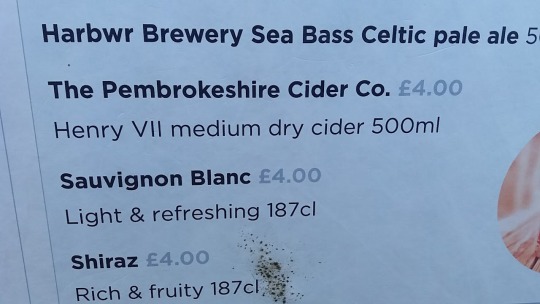
View On WordPress
#"Lambert Simnel"#"Perkin"#Brecon Castle#Carew Castle#Carmarthen Castle#castles#executions#Gerald of Windsor#Henry Rice#James Lord Audley#limestone#Lord Ferrers#Milford Haven#Nesta of Wales#Nottingham Castle#Pembrokeshire#rebellions#Rhys ap Thomas#The Cornish Rebellion#Wales
0 notes
Note
Hi there,
I noticed you've been following me for awhile thanks. I saw some of your posts on the Howards and noticed that you mentioned somewhere that the Duke of Norfolk might have played a part in Cromwell's downfall in 1540 in order to get revenge for Anne Boleyn's execution.
That's a very interesting theory and I like it. Is there much evidence for any affection Norfolk or the other Howards had for Anne? I've always seen Norfolk as an evil villain who treated his family badly but maybe there was more to him than that?
Hello.
Sorry it's taken such a time to respond, but as you'll see it's VERY long, so I wouldn't start reading this on the bus.
Part One
As a child I used to be very annoyed by 20th-century writers treating historical figures like ice-cold robots welded to lifeless 'logic', and incapable of doing anything rash or ridiculous.
Oh why would Richard kill the Princes when it'd make him look bad?!
See? It must've been a plot by Margaret Beaufort all along.
(I know it's improved since then, but that first impression stuck.)
Reading history, I've always assumed family members instinctively cared for one another, unless their words and actions proved otherwise, and yet the above mentality pushed the exact opposite: that it was 'irresponsible' to even suggest any sort of natural bond between relatives unless they actually wrote it down, which is an absurd standard.
To me it's as silly as saying 'we don't know' if they breathed air as no one put it in a diary.
What does it matter how long ago they lived? They're still people.
I've even seen the extremely smug attitude that caring about one's own children is entirely a 'modern' invention, and the Mediæval and Tudor age wouldn't have understood such a concept.
Wouldn't have understood love!
Since then I've been interested in emotional bonds between friends and family, given how much closer they were than now, particularly rebelling against the idea Elizabeth didn't care about Anne.
And the Boleyns / Howards are my favourites, so their clannish level of kinship fascinates me the most.
Let's go through some of them:
Catherine Howard, Countess of Bridgewater
Catherine's first husband was Rhys ap Gruffydd, heir of a powerful Welsh family.
Problem was when his grandfather died Rhys got passed over (I expect because he was seventeen) in favour of Walter Devereux (the 10th Baron Ferrers), and Rhys wasn't 'avin that.
Devereux arrested him for disturbing the peace, which sent Catherine bananas as she'd convinced herself they were all out to get her husband.
In response she stirred up the local gentry and marched on Carmarthen Castle, threatening to burn the door down and bust on in there if Rhys wasn't freed.
Well after that unease and bitter factionalism bubbled up to denonation point, with servants killed on either side and Catherine attacking and destroying Devereux's property, meaning he sent word to England descibing BOTH of them as leaders of a 'rebellion and insurrection'.
Rhys sounds like a knob to me. You could say Henry caused this mess in the first place, but Rhys ought to have known where all this was leading.
His Wiki page lays it on that he was some noble folk hero martyred to the Reformation, but adding 'FitzUrien' to his name, thereby playing on ancient Welsh myths and thus (supposedly) announcing himself as Prince of Wales, was pushing his luck to say the least.
That's a worse blunder than Henry Howard made and no one ever feels sorry for him.
I shouldn't think he had conspired with James V, but going by this quote from the chronicler Elis Gruffudd (a very interesting fella in his own right) he wasn't universally mourned:
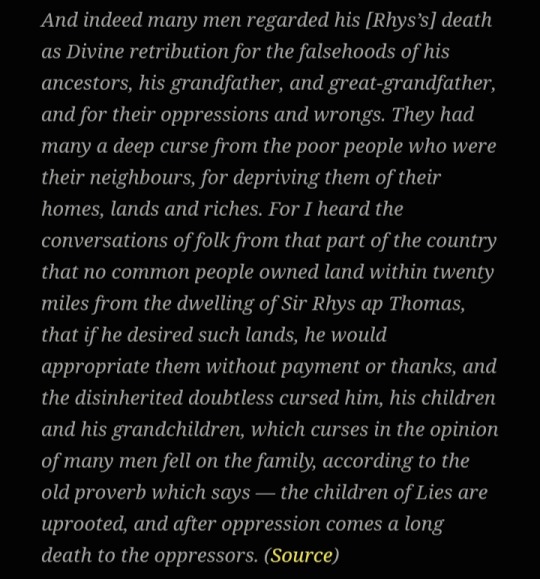
Rhys was beheaded in 1531, but Catherine was in the soup herself after all she'd been up to assisting him.
As Gareth Russell says:
'While we may never know exactly how much his own actions brought about Rhys's death, we can be certain of the devastating effect it had on his widow. She had been intimately involved in her husband's quarrel, and so the possibility that she would be accused of complicity in his alleged treason was tangible.
Left to forge prospects for their three young children — Anne, Thomas and Gruffydd — and fearful for herself, Lady Katherine followed in the footsteps of her elder brother Edmund and flung herself on the mercy of their niece, Anne Boleyn. Once again, the family's dark-eyed golden girl did not disappoint.'
It notable how often you see Anne, and later Elizabeth, willingly pull relatives out of sticky situations, which suggests at least some previous attachment on both sides, as I shouldn't imagine either would be too happy doing it for the more hostile characters.
Compare Katherine's reliance on Anne, a half-niece, to Elizabeth Seymour writing to Cromwell for help, not Jane, her own sister.
'She may even have tried to limit the damage for her aunt and young cousins shortly before Rhys's execution.'
Which was good of Anne considering Rhys had slagged her off, with both of those links having the nerve to imply his death was somehow her doing.
Had he lived, I do wonder if his opposition, compared to Catherine, who, familiarity or not, no doubt wanted to benefit from the connection, would've provoked a certain marital discord.
'Rhys had been attainted at the time of his conviction, meaning that the Crown could seize his goods and property, but his Act of Attainder specifically and unusally made provisions for his widow, who was left with an annual income of about £196.
If Anne could not save Rhys, she worked hard to salvage his family's situation.'
Meaning she got Henry to surrender some of his ill-gotten gains solely to avoid her aunt's destitution, where plenty of other widows and orphans were left to fend for themselves.
Anne also got Catherine a new husband in old-timer Henry Daubeney, but they bloody hated each other and split up soon enough.
According to Eric Ives:
'Over the winter of 1535-6, Katherine Howard, Anne's aunt, was trying to secure a separation from her second husband, Henry, Lord Daubeney. She told Cromwell that the only assistance she was receiving was from the Queen herself, and this despite the strenuous efforts which were being made to destroy her standing with Anne.
The help may have been very practical indeed; Lord Daubeney, who was certainly pleading financial hardship at one stage, reached an amicable agreement with his wife after Anne's father had made available £400.'
Even though this post about Catherine insists neither Anne nor Norfolk gave a toss about her personal woes, from the looks a things Anne was trying to solve this problem too.
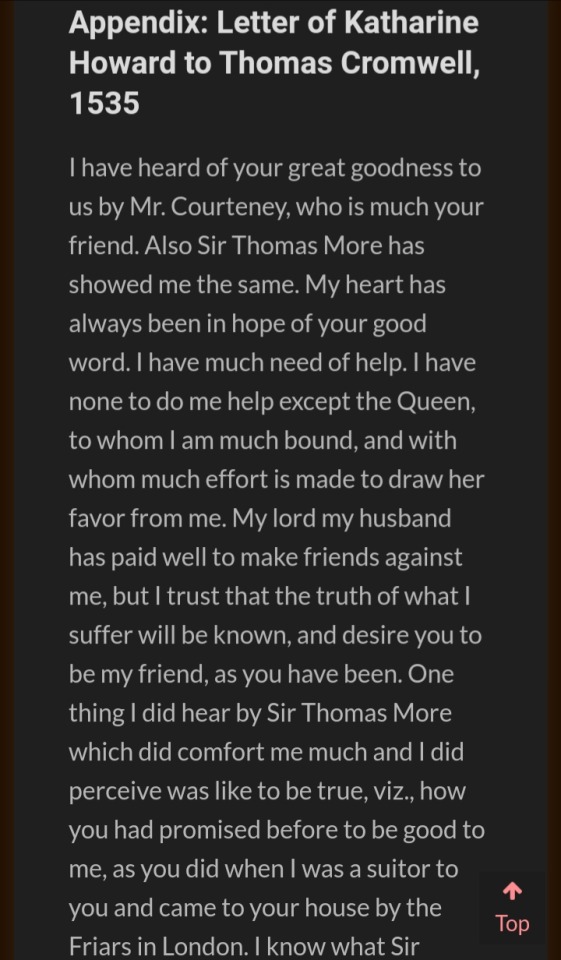
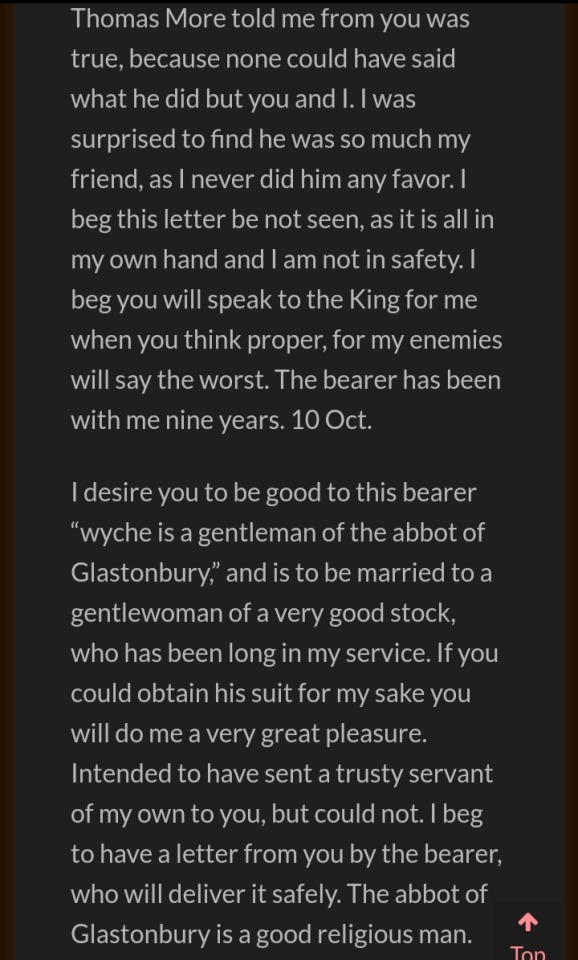
'I have none to do me help except the Queen, to whom I am much bound, and with whom much effort is made to draw her favour from me.
My lord my husband has paid well to make friends against me, but I trust that the truth of what I suffer will be known...'
One wonders how all these paid agitators ended up gathered 'round Anne, nagging or distracting her from Catherine's cause, but evidently she wasn't put off.
Plus, according to that last link, Catherine never learnt her lesson and took part in the Pilgrimage of Grace an' all, raising 3,000 men against Henry!
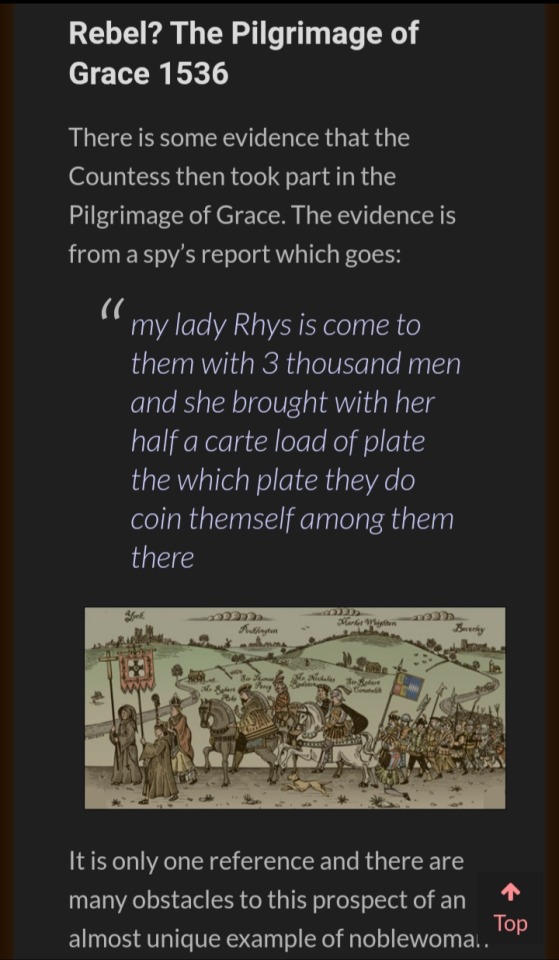
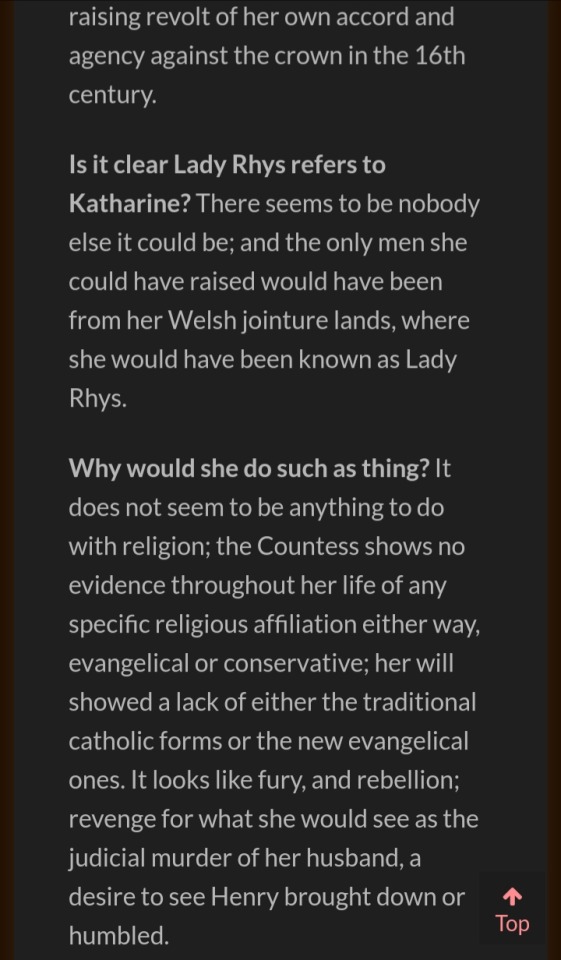
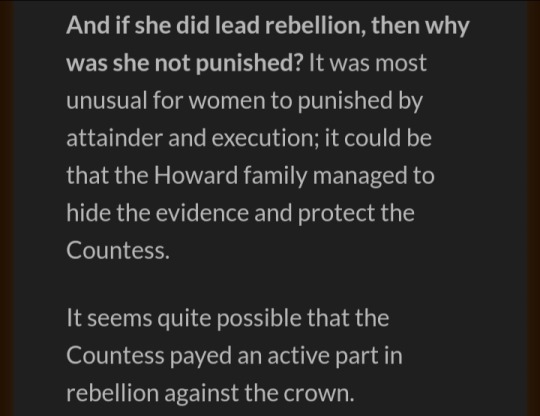
By the sounds of it, this isn't a sudden burst of furious piety at work, rather there's almost an absence of religion in Catherine's life.
The obvious explanation would be yet again wreaking vengeance in Rhys's memory, and that's evident given her long-standing vendetta against his disloyal servants.
But would it be too much to think she was motivated to a certain extent by the death of her niece and nephew, being 'much bound' to the former?
And as she avoided all punishment, the remaining Howards (i.e. Norfolk) had to have covered up for her.
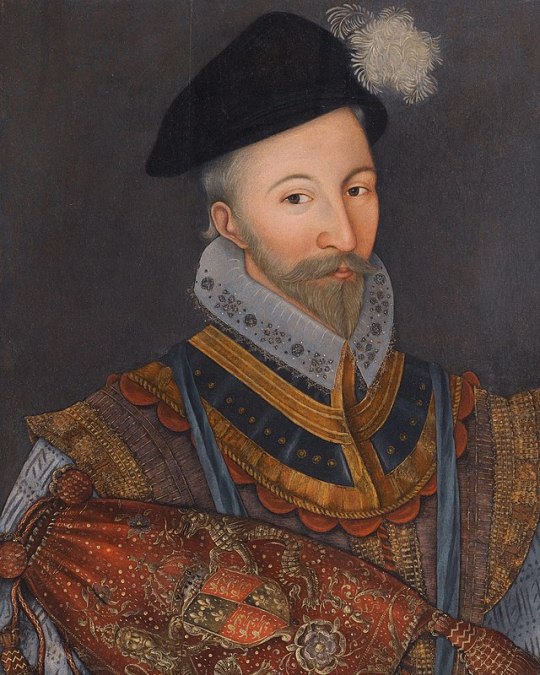
William Howard, 1st Baron Howard of Effingham
In 1529 there was much scrapping over the wardship of the Broughton sisters.
Wolsey ended up with the younger, Katherine, but upon his fall it seems Anne got the girl transferred to the care of Agnes Tilney, who then married her to William, so Anne was responsible for his first marriage.
(Not that it prevented Katherine Broughton from acting, as Ives puts it, as 'ringleader', in a demo for Mary six years later, and getting herself locked up in the Tower as a result, but there you go.)
Given the amount of important roles he enjoyed during Anne's queenship, all whilst barely out of his teens, she must have liked him:
• 1531: Ambassador to Scotland.
• 1532: Travelled to Calais with Anne to meet Francis.
• 1533: Served as Earl Marshal during Anne's coronation, in place of Norfolk.
• 1533: Held the canopy at Elizabeth's christening.
• 1535: Visited Scotland to award the Order of the Garter to James.
• 1536: Went again to Scotland to arrange a meeting between Henry and James.
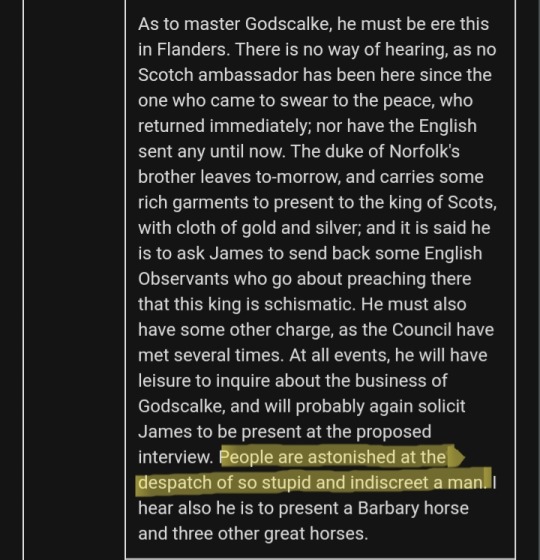
Besides, Chapuys said of him:
'People are astonished at the despatch of so stupid and indiscreet a man.'
So he had to be Anne's friend.
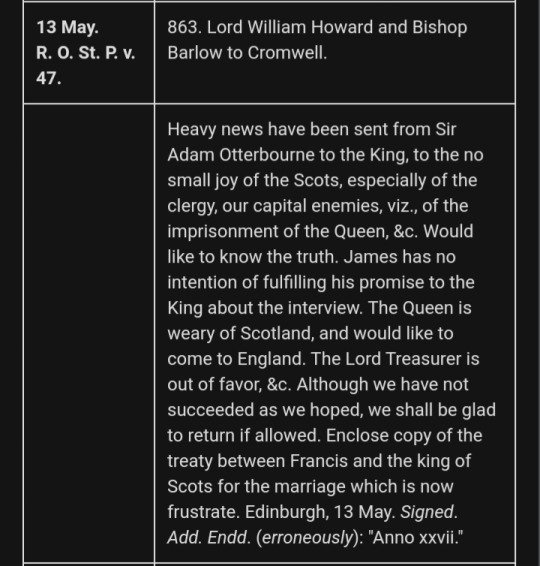
Once he hears of her arrest, William curses it as 'heavy news', demanding to know the truth from Cromwell and resenting all the Scottish clergy as 'capital enemies' for rejoicing in her fall.
Mainly I'm mentioning him to discuss his own character, and where his evident loyalty to other family might give us a further suggestion of his relationship to Anne, and how he kept to that sense of honour even when it led him into dangerous territory.
Consider, for example, how he named his son Charles after his brother, and called his daughter Douglas in honour Margaret Douglas, Charles's wife, thus commemorating their doomed romance.
You'd also be surprised how often he turns up in Young and Damned and Fair, as he appears to have been Katherine's closest uncle, for all that she's usually connected to Norfolk.
Indeed, so deep was he in it Agnes had to be advised not to warn him off coming home, meaning he arrived from France and found himself immediately clapped in the Tower, whereupon he craftily claimed all his best plate was washed overboard so Henry couldn't get at it, which worked.
Later, his connection with Henry Howard ensured he missed out on being Admiral, and when he did get it, Mary took it off him to punish his partiality to Elizabeth.
There's a section here detailing his bond with Elizabeth, where he's credited with saving her life, if you ignore the obvious errors:
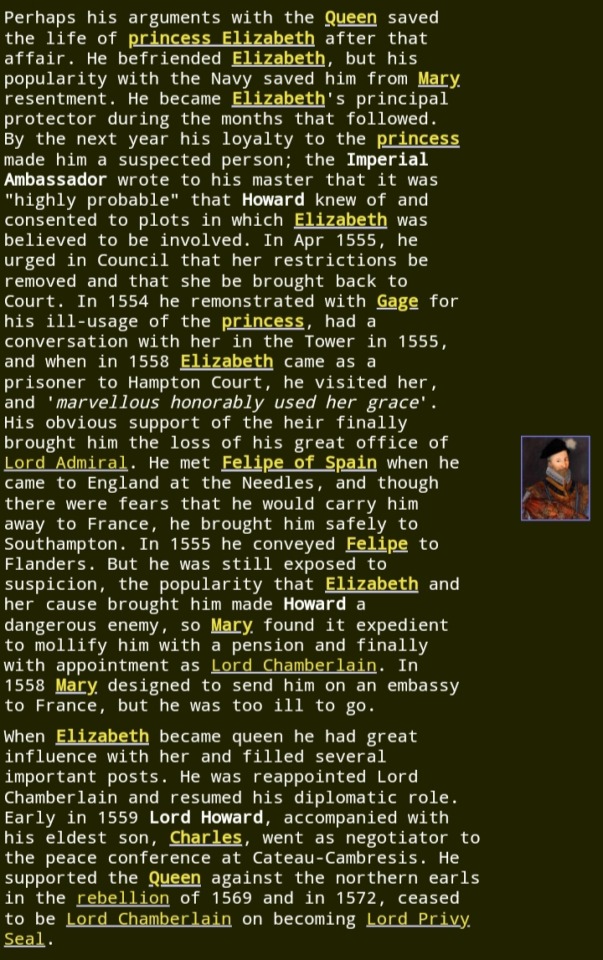
I especially like the idea everyone feared William would kidnap Philip!
However, there's a very odd paragraph in his son's Wiki page:
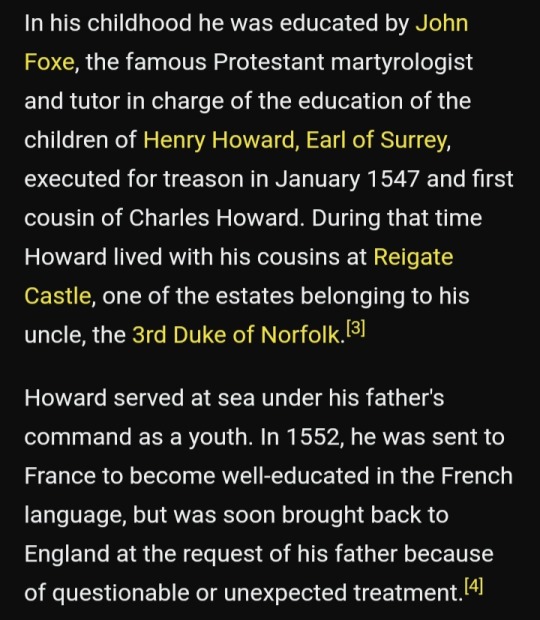
'In 1552, he was sent to France to become well-educated in the French language, but was soon brought back to England at the request of his father because of questionable or unexpected treatment.'
Am I mad or does this imply Charles Howard endured sexual abuse in his teens?
Were it only poor lodgings or sub-standard teaching, he could've moved elsewhere.
Were it excessive beating, you'd expect it to be made plain, not using all this cagey, obfuscating language.
But the thought did lead me to ponder their father-son bond, where Charles, whatever shame he suffered, knew he was loved enough that writing to his father would make it stop.
And William, reading it, rescued him immediately, proving the boy right.
This is a mere fancy of mine, but when it's just after Elizabeth's ordeal, whom he obviously cared so much about, and knowing she could easily have died like Katherine, which happened in part because he never stopped Dereham, one wonders if his moral failing then pushed him to protect Charles and Elizabeth later.
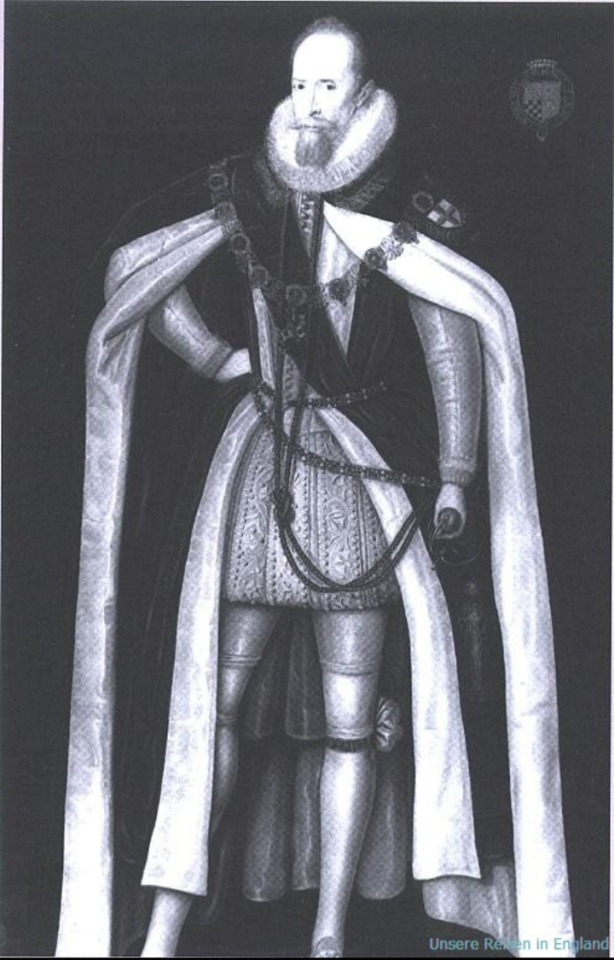
Thomas Howard, 1st Viscount Howard of Bindon
I'm hard-pressed to unearth much information on this lad, but everyone leaves him out so I won't.
There's gotta be some reason Elizabeth ennobled him, and so early on (in 1559) before he'd had the chance to serve her.
It can't just be she looked round the court, noticed he was the last of Norfolk's children, and awarded him for that.
I wish we knew more about Elizabeth's childhood, as in who she met and associated with at court, because you can be certain she met the Howards then.
I also want to add a little about his eldest son, the 2nd Viscount, who was...odd, to say the least:
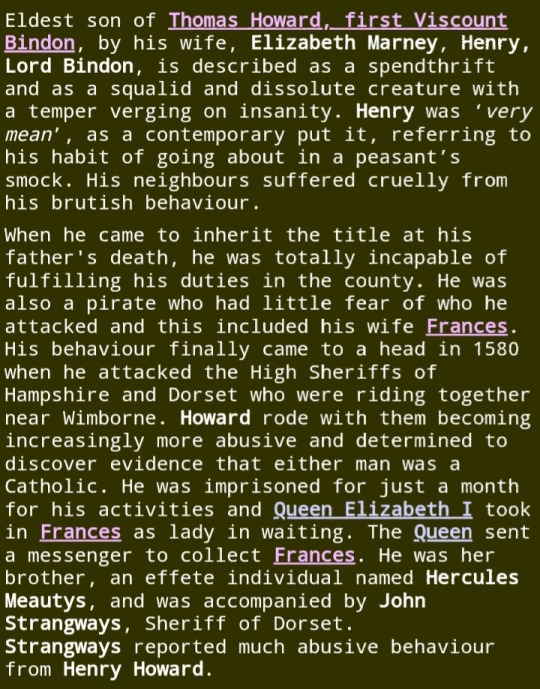
• Being a pirate;
• Dressing as a tramp;
• Beating everyone including his wife.
This gave me the the idea that perhaps his and Norfolk's reputation had somehow been rolled up together over the centuries, where this Henry Howard, although unknown today, was probably infamous in his time, and maybe his behaviour in a sense lended credibility to the accusations of spousal abuse against Norfolk, where people felt Henry 'got it from somewhere'.
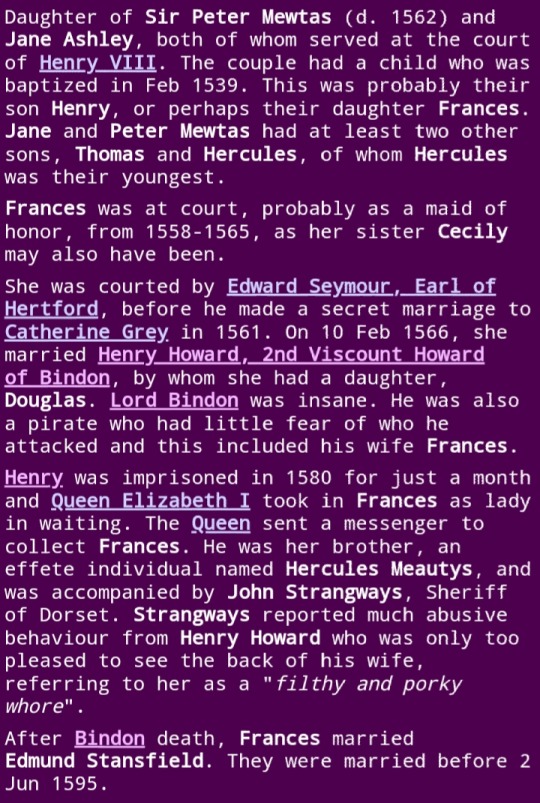
When Elizabeth learnt what he was up to, she sent Hercules Meautys (what a name) to rescue his sister, and took Frances in, with her husband dubbing her 'a filthy and porky whore', which was rich coming from him.
And his other son, the 3rd Viscount, killed his own father-in-law and had a long-running feud with Walter Raleigh.
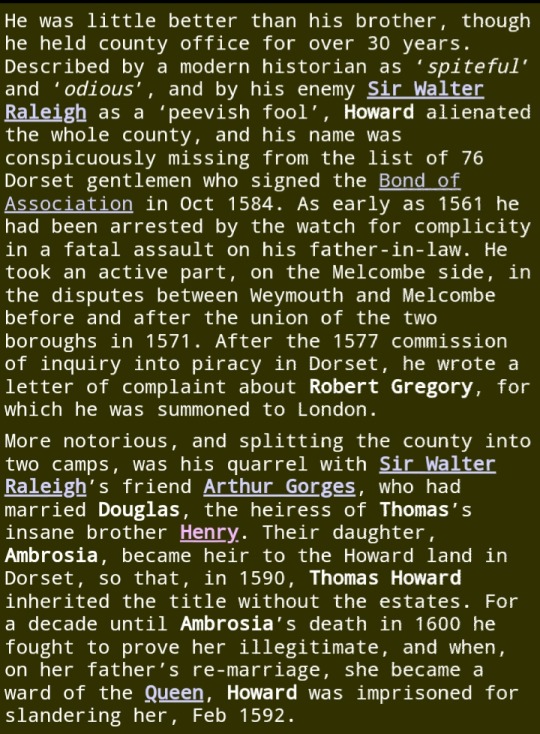
He also spent years trying to have his brother's granddaughter Ambrosia declared a bastard to grab all her land, so Elizabeth locked him up!
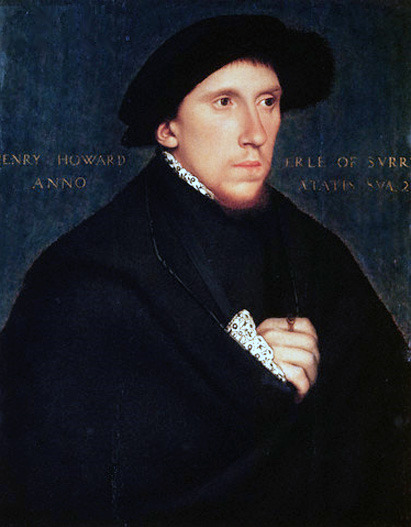
Henry Howard, Earl of Surrey
Anne found Surrey a wife and took him with her to France, where he and FitzRoy remained as honoured guests until the next autumn.
He was then obliged to serve as Earl Marshal as Anne and George were sentenced to death.
Four years later, according to Gareth Russell, Surrey not only watched Cromwell's execution, but gloated about it afterwards:
'Henry Howard, Earl of Surrey, stood at the forefront of the crowd and watched the scene without pity. He was missing his cousin's wedding to be here to see his family's bête noire finished off.
Later that day, he could not conceal his good mood. It felt to him like a settling of scores:
"Now is the false churl dead, so ambitious of others' blood."'
What does this mean?
Who's blood has Cromwell lusted after?
Who did he kill four years ago?
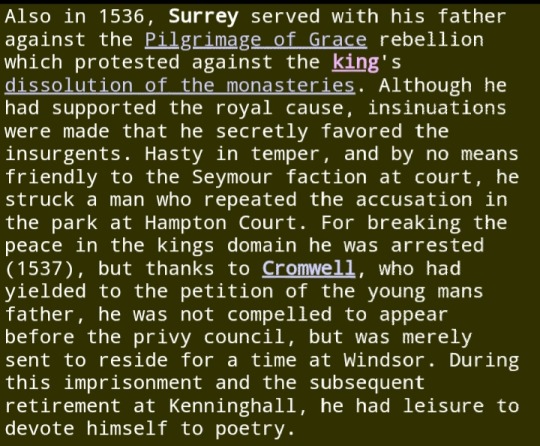
Surrey can't be referring to himself when Cromwell had actually protected him from punishment not long before, which in itself suggests a few interesting things:
• Cromwell was not yet aware of just how much the Howards despised him, as in, up til then his relationship with them was at least civil, cordial even, so the old line about Norfolk begrudging the 'new men' just because they're new men doesn't quite wash.
• This would've the perfect opportunity to bring down a mighty rival, but instead Cromwell felt bizarrely generous and intervened on Surrey's behalf, meaning he saw no harm in preserving the family, and instead thought it useful to get them on side.
• Why does he feel the need to favour the family?
Has he done something to antagonise them?
• The Howards are collectively putting on an Oscar-worthy acting routine of feigned friendliness, or at least indifference to said actions, so Cromwell, whilst he might suspect he's given slight offence, assumes it'll soon be forgotten if he pats them on the head here and there.
• Except whatever Cromwell did, saving Surrey wasn't enough to warrant forgiveness.
And let's examine this quote in detail:
Surrey is at 'the forefront' of spectators, keen to behold Cromwell dying in all its gory brutality, besides opting to watch such a horrendous deed over attending Katherine's wedding.
Instead of a happy celebration of his family's success, something he could've easily enjoyed in the knowledge of Cromwell being dealt with out of the way, he insisted on serving as a witness, as if it wouldn't be over until he'd seen it done, almost to be sure that it had.
For this would 'settle the score', shedding his blood in payback for... what exactly?
Thetford Priory?
Is that all?
Or for the blood Cromwell himself so coveted?
And even the sight of such suffering left Surrey unmoved, ridiculing the dead man not only as a 'churl', but a 'false' one.
False to whom?
'False' as in affecting loyalty to his Queen whilst working to bring her down?
Because is that extreme level of hatred really just supposed to be nothing deeper than empty class prejudice?
Usually, Cromwell's fractious history with the Howards is portrayed as Norfolk's one-man defamation campaign of all-encompassing lordly outrage verging on eye-popping insanity, except Surrey clearly loathed him too.
Perhaps from that we can conclude that Cromwell had become unpopular with the whole family, hence the 'bete noir' reference above.
When Surrey's resentment is remembered, it's conveniently boxed up and filed away as the same-old 'snobbery' of his father, which a very neat, uncomplicated excuse that prevents us looking into it properly.
I daresay Surrey was proud and class-conscious, but wouldn't everyone be like that, to a greater or lesser extent?
Why then is this 'haughtiness' only ever attributed to characters we're supposed to dislike, namely Anne, Norfolk, and occasionally George and Surrey, with the 'good' people somehow immune to such 'base' emotions?
Indeed, I'm starting to wonder how much real evidence there is for this common supposition of arrogance.
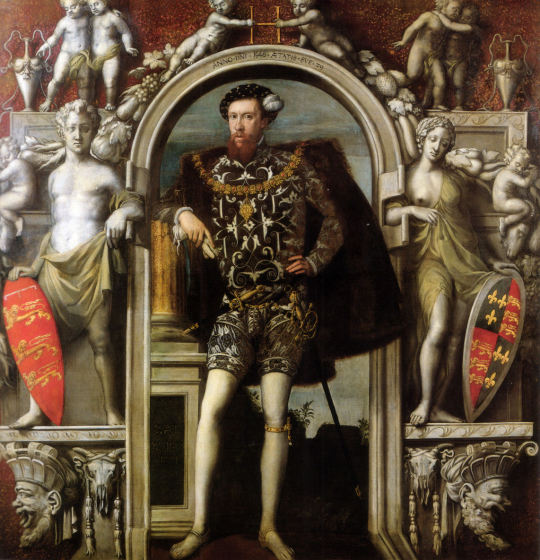
As if Surrey's known at all, it's for the manner of his death, namely he 'got himself killed' by 'stupidly' quartering the royal arms with his own, which, whilst a gross oversimplification, nevertheless defines him, where history views his character through this lens and reads his entire life backwards, as if there's no explanation for his behaviour other than he was just born to be a cocksure moron.
It plays upon modern bigotry against aristocrats, where they're all stuck-up, slow-witted inbreds fixated with the pecking order and archiac symbolism, keeping the honest worker down to prove they're better than everyone else, which is a laugh because they're all REALLY shallow, superfluous chuckleheads and deserve what they get.
Since the idea Surrey died for something so 'silly' as what badge went where slots so well into the stereotype, then it's cheapened his reputation overall.
Rather than being highly esteemed as a pioneer of English literature and the forerunner of Shakespeare, he's treated as nothing but a hot-headed toff tripped up by his own idiotic pretensions, with an end offered as a 'fitting' denouement, almost a lesson in morality; about where not 'knowing your place' or 'getting ideas above your station' leads... after vilifying Surrey and Norfolk for apparently demanding people know their place and not get ideas above their station.
Something hypocritical there.
There's also a reflexive judgementalism within this fandom and the lower end of publishing (i.e. novels and pop. history) where it's assumed if Anne or any of her family are executed, then even if they're technically innocent, they must've deserved it really, else 'the universe' wouldn't let it happen.
Therefore, known evidence is read with the most bad-faith interpretation, with any declared slip leapt upon and blown out of proportion, solely to prove their own bias correct.
You're right to think that, you are.
Hating them makes you A Good Person.
Again, this ONLY applies to Anne and her supporters, not her enemies.
No, no. They were martyrs to the Cause.
But I wouldn't say Surrey's usage of royal arms spoke to any pathological sense of superiority, certainly not to the extent it should define his memory.
Heraldry and ancestry is the lifeblood of nobility: everyone he knew fought for whatever their birth and court careers entitled them, so why shouldn't he?
Look at his sister protesting again and again and again for her rights as FitzRoy's widow: does this make her a 'snob' because she never gave up fighting?
In fact, dubbing Cromwell a 'churl' doesn't mean too much either.
The average person objects to someone because they're a thief, cheat, liar, etc. but calling them as much is a toothless insult, as they'd require a sense of honour to feel the sting.
And if they had that, they would've have committed the offence it in the first place.
So, you pick on something they probably are sensitive about, such as status or physical appearance, to get your own back.
Calling Henry VIII, for example, a fat bastard, doesn't mean you oppose him for having a weight problem, or that you dislike fat men generally.
It's that you're hitting 'below the belt' to inflict the worst punishment you can.
Oh yeah, it's petty, but the aggrieved often are.
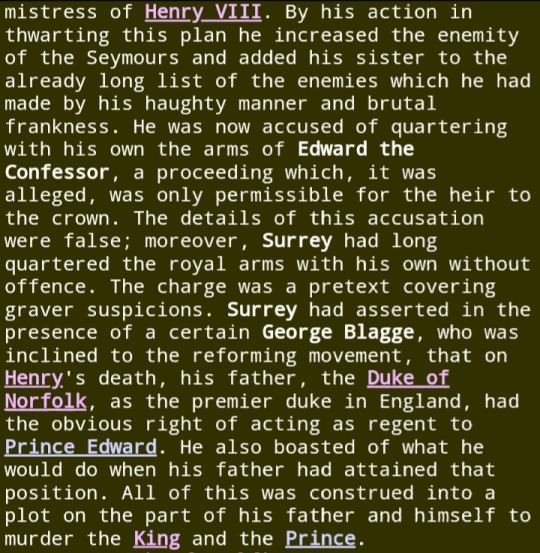
Surrey's real crime, if we deem it one, was apparently rash language of what vengeance he'd wreak on his foes once the King was gone, meaning the Seymours.
So is it mere coincidence that the main targets of this infamous 'snobbery' are those who caused or benefited from Anne's fall?
Are we to believe his only complaint, right down to twice vetoing Mary Howard's marriage, is nothing better than looking down his nose at humble Seymour origins, for they've done nothing whatsoever to draw his ire?
For all the time I've been reading history, the way the court of 1536 splits between the Boleyns and those pushing Jane Seymour, and then, once the Boleyns are wiped out, it greatest rivalry becomes Howard versus Seymour, one lasting for the remainder of Henry's reign, has always struck me as both telling and appropriate.
The idea the Howards took over hating the Seymours because of their slain family is to me to most obvious explanation; the driving force pushing the enmity beyond a decade, and blaming it all on snooty la-di-da attitudes baffles me.
It's so pat and offhand, as if it was thrown into historical research centuries ago and never questioned, passed down to us as unassailable received wisdom, rendered true from repetition, as no one likes Surrey or Norfolk enough to bother reassessing their motivations.
But could such prolonged open hostility run on no greater impulse than keeping the gentry in check?
Is THAT all?
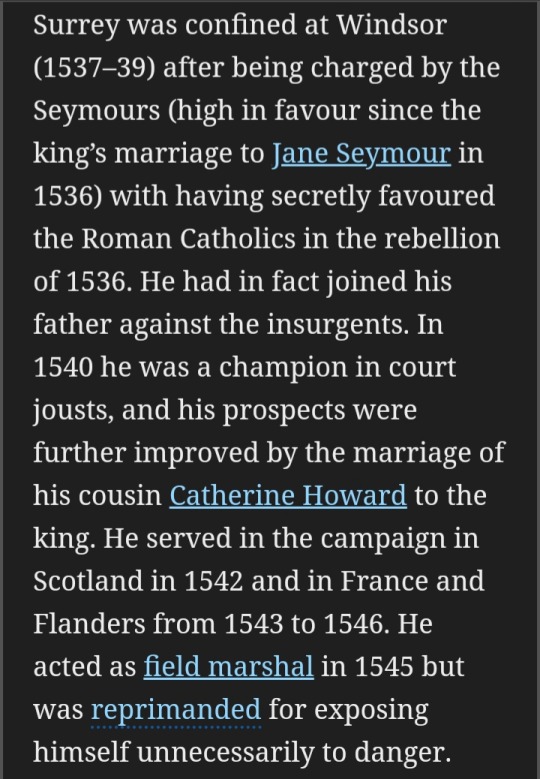
And do note how leading this narrative is, where, if we accept the Howards despised the Seymours as upstarts, then the fault for all bad blood is immediately shoved onto them and them alone, when those poor Seymour lads, rosy-cheeked and pure of heart, are just doing their best in life, working hard and loving everyone.
But oh! Those nasty Howards bullies are So Mean!
Not once is it reversed, proposing that the Seymours envied the Howards' breeding and birth, vowing to bring them down out of spite.
Instead they're absolved of all guilt in the conflict and justified in everything they do as a self-defence measure, even when they brought about Surrey's death and tried it on ten years previously.
So why on earth should he like them?
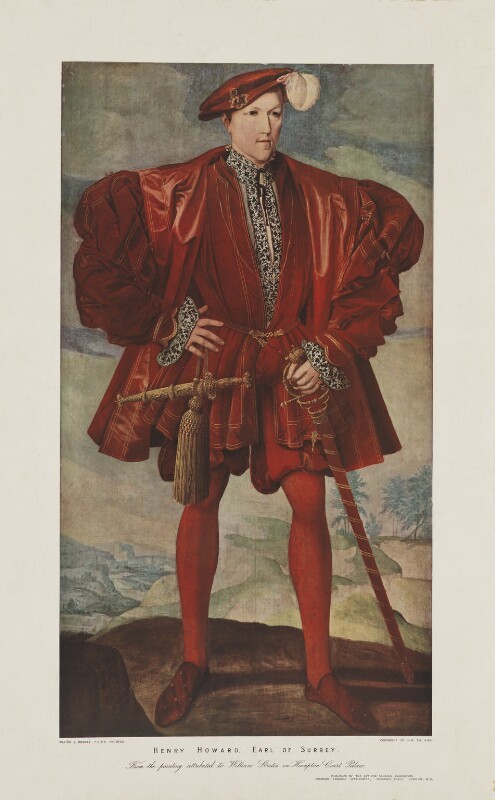
How I wish this painting still existed.
Starkey describes Henry Howard thus:
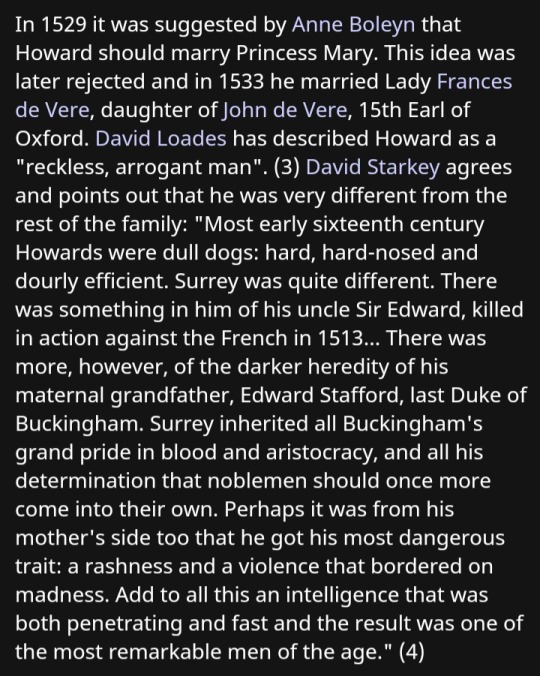
'Surrey inherited all Buckingham's grand pride in blood and aristocracy, and all his determination that noblemen should once more come into their own.
Perhaps it was from his mother's side too that he got his most dangerous trait: a rashness and a violence that bordered on madness.
Add to all this an intelligence that was both penetrating and fast and the result was one of the most remarkable men of the age.'
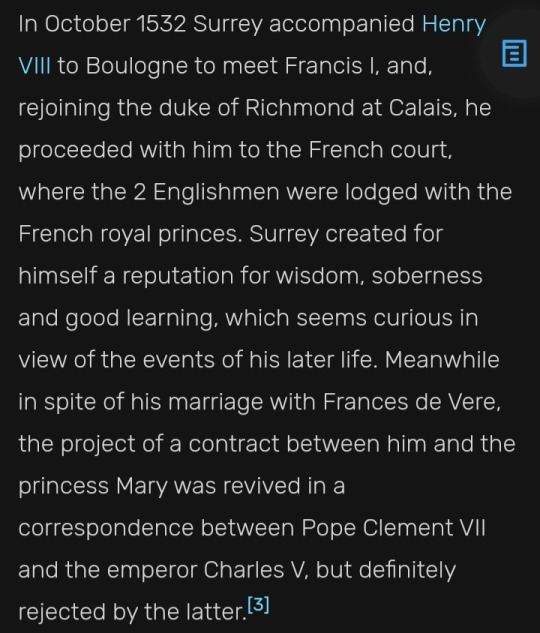
And yet I don't know of any aggressive outbursts prior to 1536, being then known for 'soberness and good learning'.
We tend to class poets of later eras as on the sensitive side, so far from being 'always like that', it may well be that the deaths of George, Anne, FitzRoy and putting down the Pilgrimage of Grace knocked him off the rails, a process then driven beyond all remedy by watching Katherine die and the suicidal shame he endured over his military failures.

Although I do like the sound of him as the hero of High Fantasy.
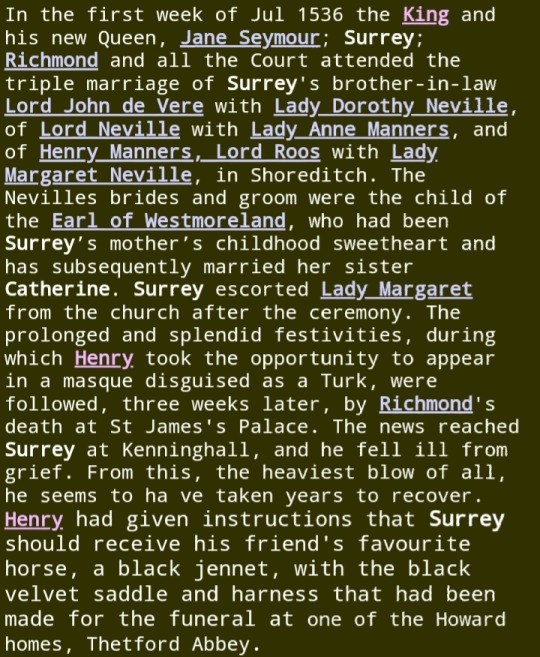
Whilst I'm here, let's look at this very awkward scenario of Surrey attending the triple Neville wedding, being the children of his mother's intended and her sister.
Considering how desperate so many are to clear Henry VIII of Anne's death, protesting how he Genuinely Believed and that makes it alright then, he's cheerful enough fannying about as a Turk less than two months later.
Finally, writing this I read several of Surrey's poems, and must include this truly endearing piece commemorating his wife's love for him:
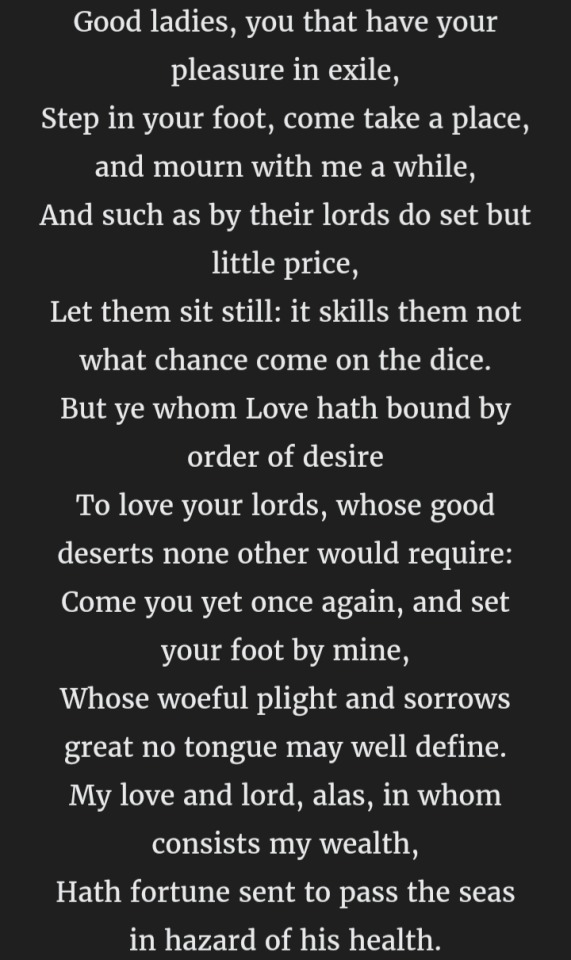
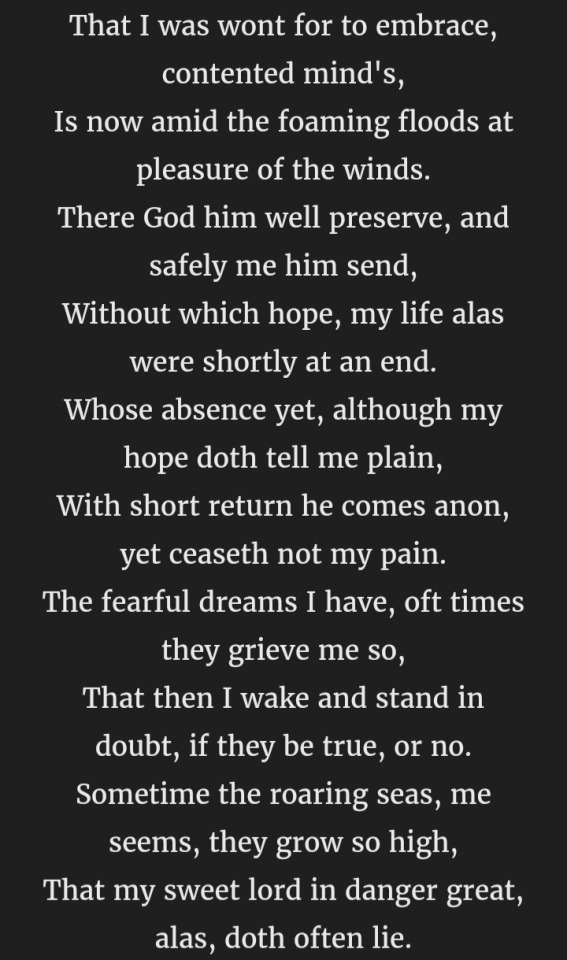
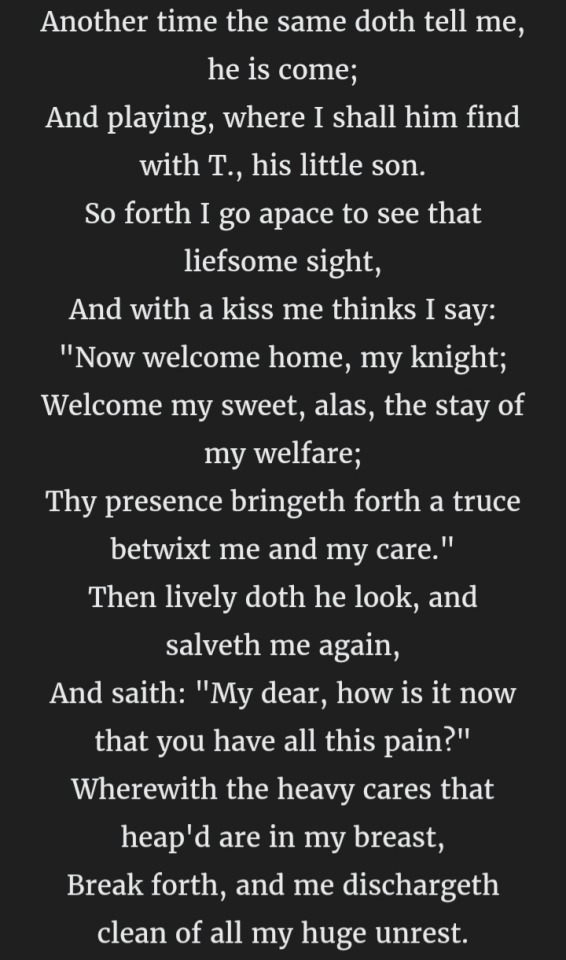
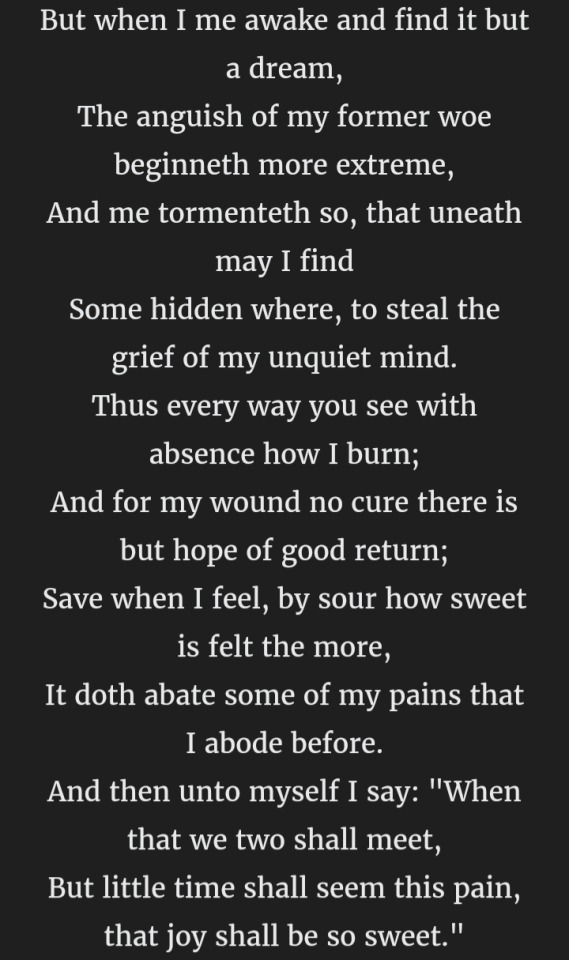
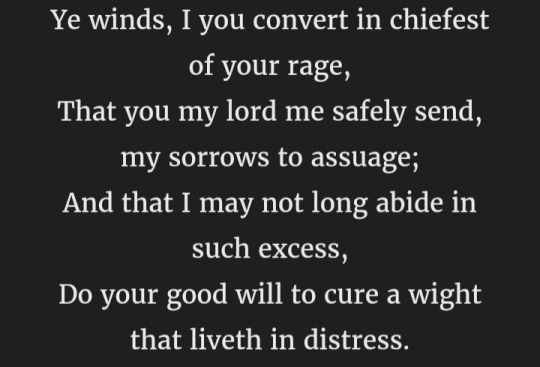
Such a poet, and still no one credits him with any tender emotions.
Anyway, don't mind me but I've hit the picture limit.
I'm not sure when Part Two will be done, but I'll let you know, come the time.
#Henry Howard#Catherine Howard Countess of Bridgewater#William Howard#Thomas Howard 1st Viscount Howard of Bindon#Anne Boleyn#Elizabeth I#Henry Howard 2nd Viscount Howard of Bindon#Thomas Howard 3rd Viscount Howard of Bindon#Frances Meautys#Rhys ap Gruffyd#Thomas Cromwell#Young and Damned and Fair#Gareth Russell#The Life and Death of Anne Boleyn#Eric Ives#David Starkey#Quotes
7 notes
·
View notes
Text
Some biographies of The Beatles make me think about this nice song:
When good King Richard, that's Richard of Gloucester Ascended the throne did he He made good his promise to lower the taxes And set all the debtors free Now kindly King Richard was called Dicky Crookback By Henry of Richmond, did he Till all of his subjects had heard the foul rumor From Dover to Anglesey Henry of Richmond, he wanted the crown To wear on his bonny Welsh head But Henry the Seventh he'd never be Till Richard the Third was dead You've heard of the princes who died in the tower The Tower of London, you've heard T'was Henry of Richmond who blamed his foul murders On goodly King Richard the Third With plotting and pledges an army was raised To force our fair Richard to yield And the Wars of the Roses than came to an ending At the Battle of Bosworth Field <…> The proud Rhys ap Thomas and handsome Will Stanley They promised their swords to their liege But shortly these bastards went over to Henry And even helped plan his siege <…> Now you may be thinking my story's told falsely Because you have read the Bard's play About Dicky Crookback, who murdered his brother All on St. Bartholemew's Day But the truth is elusive (t'was true then as now) And falsehoods are easily spread For some men became saints while some became monsters Because of what Will Shakespeare said
3 notes
·
View notes
Text
class notes
Apartheid
https://www.sahistory.org.za/article/grade-11-what-were-consequences-when-pseudo-scientific-ideas-race-became-integral
Climate theory (of racism) - the colder the weather, the smarter the human (read: stamped from the beginning). The theory suggests that black people in Africa had no way of being intelligent
Simian traits - “ape like”, connected to black portrayal and Irish portrayal: JFK significance: he was Irish and catholic
White people made themselves feel racially secure by making themselves the ideal face shape and differentiating themselves from other races “you are not white!”
“Wide sargasso sea” jean rhys
Darwin, the father of modern evolution theory, was himself religious and was antagonised by the church for disproving the creationist theory. He was also not pleased with how his theories were being used to persecute other races and nationalities
What were the four different categories of people introduced under the Race classification laws?
White
Indian
Coloured
Black
What was the pencil test and what purpose did it serve?
If a pencil was placed in a students hair and fell, they were white. If it stayed, they were not white enough
What was the Sharpeville massacre and what was it caused by?1952
A protest forcing law enforcement to arrest them in the hopes that they would collapse the jailing system ended in thousands being arresting
March 21st 1960
Police opened fire on unarmed protest killing 70 and wounding 180
Passbook - document that black people had to carry at all times to be able to travel
The protest was to abolish passbooks
What is (somewhat) ironic about Nelson Mandela having been awarded the Nobel Peace Prize?
He won the Nobel peace prize despite not being a pacifist
Imagine you educate someone online about systemic racism. Feel free to rant
Website is down
What factors increased the tensions between the blacks and the whites in the SA, and caused the later to want to control the former?
Black people were allowed to work in white spaces as many of the white population went to fight in ww2
Black people had to move into some white spaces such as living and work
ANC - African National Congress
4. He won the Nobel peace prize despite not being a pacifist
5.
6.
Dei steigers- “the sixties generation”
Brinks book was the first book to be banned by the south african government
How brink outwitted the censors
1979 printing: 3000 copies through a private publishing press in Johannesburg
Detected 2 weeks later - too late to confiscate the first printing, but the book was banned
Simultaneous publication in uk - a great success
Black June
Multi-day youth riots in Soweto started on the 26th June 1976
Brutally suppressed - armed personnel carriers, machine guns and helicopters against sticks and stones
SA internationally condemned for the massacre of the youth and the use of the violence at a mass scale
According to official statistics 175 killed (official citizens), 1140 wounded, 1300 arrested
A moral obligation
a dry white season illustrates the thesis made by brink in his article “after Soweto” 1976
following the massacre, the white citizens of SA shoulder a tremendous moral responsibility, which each should fulfill no matter the personal consequences.
Ben du Toit is an example of a person who took this moral obligation to the end.
Torture
Torturing political prisoners was frequent in SA in the 70s
The 1973 report of the UN Special Committee
Against Apartheid described over 100 cases of mistreatment of prisoners
Often used by Special Branch, specialised in detecting and fighting anti-government activity (methods near-identical with the Gestapo's)
According to the Western press, in 1977 alone at least 20 arrested people died in shady circumstances.
The author inspired some of the stories that happened to the protagonist from the experiences of others such as;
mohammed salim essop
Stephen bantu biko
Ahmed timol
Donald woods
James Thomas Kruger
To research: Steve Biko / Stephen Bantu Biko
Birth date: 18.12.1946
Death date: 12.09.1977
Founder of the “Black Consciousness” movement in South Africa
BCM was an anti-apartheid movement that was started in 1960. The movement started after the South African government outlawed the Pan-Africanist Congress and the African National Congress following the Sharpeville Massacre.
In his life, Biko was part of numerous anti apartheid movements. He began his efforts in protesting while at university (he first studied at st. Francis College and then at the University of Natal Medical School where he joined the multiracial National Union of South African Students).
His involvement lessened when he realised he found the NUSAS focused less on merging the rights of black and white people, but rather on viewing black people as the rightful majority. This was his reasoning for founding the SASO and becoming its president. The organisation was founded on the philosophy of black consciousness.
He drew censure in 1973 when SASO, its members and statements were restricted and banned. He reverted to operating covertly and, as a result was arrested and later died of died due to the torture he experienced while under arrest. He was found at the age of 31 outside a hospital naked, shackled and having experienced a brain haemorrhage.
Police denied responsibility for what happened to Biko, however, in 1997, five former officers admitted to being responsible for Biko’s death and applied for amnesty to the Truth and Reconciliation Commission (a way of getting consequences for their wrongdoings and committed atrocities).
216, 262
Notes:
Dark, uncertain
Charcoal metaphor
Highlight
2 notes
·
View notes
Photo


Pages from the Proffwydoliaeth y Wennol (Prophecy of the Swallow) pertaining to Henry VII (Wales, late 16th cent.) — National Library of Wales, Peniarth MS 58
Peniarth 58 is a collection of Welsh language prose and verse prophecies (daroganau) compiled by a single scribe. The manuscript was likely compiled in the late 16th century, but incorporates a number of prophetic materials pertaining to the accession of Henry VII a century earlier. The most important of these is the medieval Proffwydoliaeth y Wennol (Prophecy of the Swallow), which anticipates Henry’s return from exile and the deposition of Richard III.
The original Proffwydoliaeth was likely written between Henry’s first attempt to take the throne in October 1483 and his success at Bosworth in August 1485. It incorporates symbols common to 15th century Welsh political prophecy: the swallow, a conventional Tudor cipher (first applied to Henry’s grandfather, Owen Tudor); and the raven, taken from the crest of the Welsh house of Dinefwr, the arms of Henry’s ally Rhys ap Thomas. As on the march to Bosworth, the prophecy describes the swallow (Henry) being aided by the raven (Rhys ap Thomas):
“And [the swallow] shall receive a warning in secret from the raven … and then the swallow flies over the sea, and [his] birds retreat, some to the height of the wild mountains, others to secret hiding places in the valley, only the smallest part of his birds go with him.”
A’r rybydd a gaiff yn ddirgel gan y deryn bran … ac yna ir heta y wenol dros vor ai hadar a ant ar engkil r(hai) i vchelder y mynyddoedd dyrys eraill i ddirgel llechvae yn y dyffrynt nit a gida ac ef nam y rhan leia(f) or adar.
The prophecy also features the mole or “mab ddall” (blind son): a prophetical figure representing the final king of the Saxons, after whose age British (Welsh) restoration is promised. Here, the mole can only be Richard III, described as carrying out “poisonous deeds”. The prophecy foretells the swallow’s return to Britain to battle the mole, presented as a board game (a common motif in Welsh literature):
“[The swallow] lands back in the island of Britain to avenge the old deeds. Then he begins of his game afresh and arranges his countrymen on the table and he throws the dice on the board and the old others he plucks out irreverently.”
Y tiria dracheffyn i ynys brydain i ddiail i hen weithyredo(e)dd. Yna i dechreu oi chwarev o newydd ac i gossot i wyr genedyl i hvn yn y dabyler ac i bwrw y dissie(u) am y klawr ac i tyn i hen eraill allan yn amharchvs.
The Proffwydoliaeth concludes with the swallow’s triumphant return and the restoration of the Britons. It is uncertain whether the Welsh understood the prophecy to have been fulfilled upon Henry’s accession in 1485, but the existence of Peniarth 58 and the labour required to compile it suggests the particular longevity of the Tudor legend in Wales.
Sources: National Library of Wales (Llyfrgell Genedlaethol Cymru); Victoria Flood, ‘Henry Tudor and Lancastrian Prophecy in Wales’, Proceedings of the Harvard Celtic Colloquium Vol. 34 (2014); Ibid, ‘Political Prophecy and the Trial of Rhys ap Gruffydd, 1530-31’, Studia Celtica Vol. 50, No. 1 (2016)
#henry vii#rhys ap thomas#wars of the roses#y mab darogan#welsh language#welsh history#medieval#manuscript
51 notes
·
View notes
Text

16 notes
·
View notes
Text
Richard III and the Bosworth Campaign :: Peter Hammond
Richard III and the Bosworth Campaign :: Peter Hammond

Richard III and the Bosworth Campaign :: Peter Hammond soon to be presented for sale on the terrific BookLovers of Bath web site!
Barnsley: Pen & Sword Military, 2011, Hardback in dust wrapper.
Contains: Black & white photographs; Black & white drawings; Maps; References; Genealogical tables;
From the cover: On 22 August 1485 the forces of the Yorkist king Richard III and his Lancastrian opponent…
View On WordPress
#978-1-844-15259-9#ambion hill#battle of bosworth field#books written by peter hammond#britain rulers biography#cheyne#earl oxford#first edition books#handgunners#henry tudor#jasper tudor#john howard#king england#kings britain#military leadership#rhys ap thomas#richard iii
0 notes
Text
"Arthur was waited on by men of his own generation from the heart of the Tudor regime, like Anthony Willoughby, second son of the lord steward Robert, Lord Willoughby de Broke, or Maurice St John, favoured great-nephew of Lady Margaret Beaufort; these were the men to whom he famously said on the morning after his wedding night 'Bring me a cup of ale for I have been this night in the midst of Spain'.

He was also served by men blighted by the Tudors, like Robert Ratcliffe, son and heir to John Ratcliffe Lord Fitzwalker, attainted and executed for plotting with Perkin Warbeck in 1495-6. Ratcliffe was there when Arthur spoke to Willoughby and St John, and five months later he helped them carry the canopy over Arthur’s corpse. Lastly, and significantly, Arthur was served not only by those from the geographical heart of Tudor England [...] but also by leading men of the rising generation from the peripheries of the Tudor realm. His master of the horse, also present that morning after the wedding night, bearer of the prince’s banner at the funeral, was Gruffydd ap Rhys, son of Sir Rhys ap Thomas of Dinefwr, the greatest man in South Wales after the death of Jasper Tudor. [...]

Arthur might not have tried to govern his whole realm too much like southern England, as Steven Ellis has argued Henry VIII did, with dire effects. In that measure at least did his preparation for kingship might have made him a different king not only from his father, who had had spent too long in Brittany to know the realm he had to rule, but also from his brother, who had spent too long in the Thames Valley. In other ways his preparation for kingship seems to have been designed to make him at once a model humanist prince and recognizaby his father’s successor.”
From: Prince Arthur’s Preparation for Kingship, Arthur Tudor, Prince of Wales: Life, Death and Commemoration. Edited by Steven Gunn and Linda Monckton.
#Tudor dynasty#The Tudors#Prince Arthur of Wales#Prince Arthur#Prince Arthur Tudor#Arthur Tudor#King Henry VII#Rhys ap Thomas#Wales#History#nobility#kingship#late middle ages#Tudors#Prince of Wales
23 notes
·
View notes
Photo





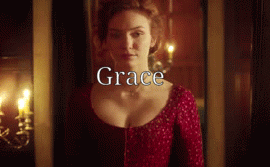
MARY: SERIES ONE
When King Henry VIII announces his daughter unable to inherit the crown of England, Princess Mary Tudor and her friends at court rebel and conspire against him.
An imagined six episode psychological drama series, focusing on Princess Mary Tudor and the intrigues, secrets and lies of Henry VIII’s court...
THE KING’S PEARL
Princess Mary Tudor, Princess of Wales and heir to the throne of England, is at her court in the Welsh Marches. Rhys ap Gruffydd kneels in irons before her; he has been arrested for inciting rebellion and is on the way to the Tower of London. Rhys petitions Mary for help in getting his grandfather’s lands and titles restored to him, as they are his by right and not her stewards, who has been gifted them by the king. Rhys says surely Mary knows what it is like to have an inheritance threatened. Mary promises to help him when she returns to court. Rhys thanks his princess, stating that though his wife is related to the king’s mistress, Anne Boleyn will never be Rhys’ queen.
Mary returns to court for Christmas. All along the streets nobles and peasants alike cheer for their princess before she is welcomed lovingly by her parents King Henry VIII and Queen Katherine of Aragon.
There is a grand feast; Mary reunites with her father’s cousin Henry Courtenay and his wife Gertrude, one of Katherine’s ladies. She dances with the courtier Nicholas Carew while her parents watch proudly.
Mary petitions her father to release Rhys from imprisonment in the Tower. The king, delighted to have his pearl back, agrees, but refuses to grant him his grandfather’s lands and titles. The pair decide to go riding together.
On their return, Gertrude escorts Mary to see her mother. She tells Mary her father’s mistress, Anne Boleyn, has just arrived back at court. Katherine introduces Mary to Eustace Chapuys, ambassador to Mary’s cousin Charles V, Holy Roman Emperor. Chapuys promises he will do his best to help her and her mother. Katherine and Chapuys reveal Pope Clement has forbidden the king from marrying Anne, threatening him with excommunication from the church if he does.
After Mass, where the royal family pray together, a freed Rhys seeks out Mary. He thanks her for his release and attempting to get his inheritance back.
Mary goes to her father’s chambers, where Thomas Cromwell introduces himself as King Henry’s new minister. Mary asks where her father is. When Cromwell replies he is with Anne Boleyn, Mary leaves for the sanctuary of her mother’s rooms.
Henry Courtenay arrives from parliament, telling Katherine, Mary and Gertrude that the king has now declared himself the Supreme Head of the Church of England. Gertrude tells them she heard of a nun in Kent who can predict the future. Katherine warns her not to do anything foolish.
On Saint David’s Day, the patron saint of Wales, Mary is given a Welsh leek by the king’s gentlemen pensioners in a grand ceremony. She is watched by a crowd of courtiers and Chapuys, who compliments her. They talk for a while before she leaves.
Exiting, Mary comes across Anne Boleyn. They glare at each other before Anne reluctantly sinks into a curtsey. Mary ignores her.
Mary plays the virginals for her parents. Despite their praise, there is obvious tension between the pair.
At nightfall Mary and her father talk. Mary is confused how he has declared himself the head of a church that doesn’t exist. Henry says she is clever; one day his pearl will understand. After he has left, Mary tells her governess, Margaret Pole, that she doesn’t think she will ever understand.
Katherine worries when Margaret wakes her in the night to inform her Mary is ill. Gertrude brings up the Nun of Kent again, but Maria Willoughby and Jane Seymour shush her. Katherine goes to help Margaret care for Mary. As Mary continues to vomit, Katherine strokes her daughter’s hair, clutching her necklace which she believes contains a piece of the True Cross. She prays her daughter will get better, comforting her with old stories of her and King Henry when they were younger.
In the morning a recovered Mary wakes to six luxurious new dresses, a gift from her father. She immediately puts one on.
At breakfast, the queen is sat at the table alone. The king left them earlier in the morning to go on summer progress with Anne Boleyn, forcing most of the courtiers to go with them, including the Courtenay’s. Katherine smiles and tells Mary they can still have a good time, just the two of them and their households.
Reginald, the son of Margaret, is sent money by the king to study in Padua. Katherine and Margaret are hopeful Reginald will convince King Henry to recant his decision to break from Rome and marry a heretic. Reginald promises he will. Mary hugs her cousin goodbye, wishing him well.
At court, Chapuys watches on with Nicholas Carew and an incensed Gertrude and Henry as Anne Boleyn takes the queen’s role at a feast. While talking, Rhys Gruffydd is publicly re-arrested for encouraging Wales to rebel against the king, and supposedly taking the title of Prince of Wales. The group disbelieve this after what Mary did for him.
Katherine hears from Maria that Rhys has been beheaded, but she is determined to protect her daughter and keeps the news a secret.
Mary and Katherine go hawking, but on their return are sent orders to separate. Katherine promises she will see Mary soon, encouraging her to stay strong. Any bastard born of Anne Boleyn will never rule; Mary is the heir and future queen of England.
PRINCESS OF WALES
Mary and her tutor Richard Featherstone are having a Latin lesson on Utopia by Sir Thomas More. In the book women are encouraged to fight in battle; Mary tells the priest she would if she could.
Mary is walking in the fields with her ladies, Susan Clarencius and Anne Hussey, and her cousin Margaret Douglas. Her and Margaret’s cousin Frances Brandon has recently married Henry Grey. Mary is betrothed to the French Dauphin, but she has heard no news lately of a marriage... she is surprised to come across her father, riding with Nicholas. He asks how she is and Mary replies she is well, but missing her mother now she has seen him. The king is going to Calais with Anne Boleyn, now the marquess of Pembroke, but promises to see her more often when he returns.
Gertrude sees the Nun of Kent in disguise, switching clothes with her maid. Amazed at her trance, she invites the woman, Elizabeth Barton, to her house.
Mary is having her breakfast served by her friend Henry Jerningham when she is informed by her chamberlain that her father has, with the blessing of the new Archbishop of Canterbury, Thomas Cranmer, married Anne Boleyn. John Hussey asks for a verbal response to the news for the king, but Mary ignores him entirely, continuing to talk with Henry and her ladies. Uncomfortable, he carries on with his orders; Mary is forbidden from writing to her mother and he must take Mary’s jewels. Margaret refuses to give them up to John unless she has a direct order from the king.
Gertrude welcomes Elizabeth warmly, asking about her prophecies. The nun says there may be war now the king has married Anne Boleyn; Gertrude asks her to pray her husband will remain safe. It grieves him that men of noble blood are being dismissed from the privy chamber, with the king ruled by Cromwell who is the son of a blacksmith.
That night, Gertrude tells Henry about the nun’s visit, telling him the king will flee the realm one day. Henry is horrified at her listening to the prophecies, potentially earning the wrath of his cousin when he finds out. He demands she tell the king.
Mary and Margaret Douglas are informed by Margaret that their aunt Mary has died. The pair worry over Frances, but Margaret tells them she has a husband to comfort her now. Mary fears the French accepting Anne Boleyn as queen means her betrothal will be void. The three are interrupted by Mary’s servant Randall Dodd, who delivers a letter passed on by her mother’s servant Anthony. Katherine writes she has “heard such tidings today that I do perceive if it be true, the time is come that Almighty God will prove you; and I am very glad of it, for I trust He doth handle you with a good love [...] But one thing I especially desire you, for the love that you do owe unto God and unto me, to keep your heart with a chaste mind, and your body from all ill and wanton company, not thinking or desiring any husband for Christ’s passion; neither determine yourself to any manner of living till this troublesome time be past.”
Shortly after there is an official command from King Henry to take Mary’s jewels. Her personal arms are stripped from her and her household is to be reduced, with some servants, including Randall Dodd, sent to wait on her new sister Elizabeth, whose christening John Hussey must attend.
King Henry confronts Gertrude, informing her that he knows she has visited the Nun of Kent. She petitions King Henry to forgive her, blaming her womanly foolishness. He does, and orders his cousin to as well. To show his goodwill towards her, Gertrude is bestowed the honour of becoming Princess Elizabeth’s godmother, but an annoyed Gertrude sees it as an insult.
Mary is playing a card game with her ladies and Henry Jerningham when John returns from the christening and tells Mary she is longer a princess. Mary refuses to accept it and writes to her father, believing he was “not privy to it, not doubting but you take me for your lawful daughter, born in true matrimony.”
In response to her letter the Duke of Norfolk comes to dissemble all her household; Mary is to go to Hatfield to serve her sister Elizabeth, the Princess of Wales. Mary says that title belongs to her by right, and no one else.
Mary is only allowed to take one lady in waiting with her and chooses Susan. Her cousin Margaret Douglas is to serve the new queen. Margaret offers to serve Mary at her own expense, but Norfolk refuses. Mary has an emotional goodbye with her staff. Margaret urges her to remember her grandmother had been declared a bastard before becoming queen of England.
On the way to Hatfield, one of the men escorting Mary whispers she must hold firm, for the sake of England.
Arriving, Norfolk asks if she will pay her respects to the Princess of Wales. Mary replies she knows of no other princess in England except herself. The daughter of the marquess of Pembroke has no such title - but if her father acknowledges her as his own, she will call her sister as she calls Henry Fitzroy brother.
As he leaves, Norfolk asks if can take a message to the king. Mary says to tell him his daughter, the Princess of Wales, begs for his blessing. When Norfolk refuses, Mary tells him curtly he might leave it then, and to go away and leave her alone. She retires to her bedchamber to cry.
UNBRIDLED BLOOD
Mary refuses to pay court to Elizabeth unless made to by force. When walking, she is always far in front or far behind the newborn, never at her side. She eats in her own rooms with food Susan steals from the kitchens, avoiding the public table. She has outgrown the ornate dresses her father gave her.
An outraged Gertrude shows Chapuys the letter she has received from the king, telling his subjects that they ought to thank God for giving them a lawful heir. Chapuys reveals he has already sent a Latin declaration for Katherine to sign and pass along to her daughter.
The king arrives to visit his youngest daughter. Mary is desperate to see her father, but is visited by Norfolk and Cromwell. They urge her to renounce her title, but Mary says it is labour wasted to press her; they are deceived if they think bad treatment, rudeness, or even the chance of death would make her change her determination. She asks to see her father and kiss his hand, but is refused. When they leave, she runs to the terrace at the top of the house and kneels in mercy. The king bows and doffs his cap, as do the men with him, before leaving.
The Oath of Supremacy and 1534 Act of Succession are both implemented, making Henry VIII Head of the Church of England, and Elizabeth and any other children of Anne Boleyn his heirs. The Courtenay’s are annoyed as queen Anne flaunts her belly; she is pregnant again.
Mary receives a letter from her mother, which comforts and encourages her, along with the Latin declaration Chapuys spoke of that denies her illegitimacy. She signs it and Susan smuggles it out of Hatfield back to Chapuys.
John Hussey and his wife Anne are returning home now Mary’s household has been dissolved, but before they go John talks with the Courtenay’s and Chapuys about the possibility of the emperor invading in support of his cousin’s rights. Chapuys says he is trying hard to convince his master. Henry says he wishes he had the opportunity to shed blood in the service of Katherine and Mary. John replies he could easily rise the north of England to help Princess Mary, and “the insurrection of the people would be joined immediately by the nobility and the clergy”. Gertrude reminds them of the prophecies of the Nun of Kent; perhaps there will be war over this...
When moving households, Mary refuses to share a litter with Elizabeth and is forcibly put in by guards. Roughly manhandled, she shouts a public protest to some peasants who salute and cheer her as princess. Her new caretaker, Anne Shelton, warns Mary her niece queen Anne has ordered her to box Mary’s ears as a cursed bastard when she uses the title of Princess.
After Gertrude informs him of Mary’s abuse, Nicholas pays the king’s fool to insult queen Anne and princess Elizabeth. The king is furious, banishing the jester from court, but Nicholas shelters him in his own home.
A badly bruised Mary hears of Nicholas’ actions and sends a letter of thanks to him via Susan. Shelton summons Mary to visit her, questioning why she has received a letter from Elizabeth Carew, Nicholas’ wife. Elizabeth urges her to submit to the king for the passion of Christ, otherwise she will be undone. Mary pleads ignorance and throws the letter in the fireplace.
As they watch queen Anne and her uncle Norfolk prepare to visit Elizabeth, Jane Seymour tells the Courtenay’s that the queen has had a miscarriage. They fear how she will treat Mary.
As punishment for the litter incident, Norfolk takes Mary’s remaining jewels. He mocks a brooch from her childhood spelling out the Emperor. Mary is furious, even more so when Anne visits her, urging her to honour her as queen and she will reconcile her to her father. Mary says she knows of no queen of England but her mother - but if her father’s mistress would intercede on her behalf, she would be much obliged. An enraged Anne storms out, swearing to bring down her unbridled Spanish blood.
Shelton tells Mary if she were the king she would kick her out of the house for disobedience, and that the king said she will lose her head for breaking the law and not renouncing her title. Seeing Richard Featherstone preparing to leave in the retinue of queen Anne, a quick witted Mary asks him if she can practise her Latin. The people around them do not understand as she asks if the rumours are true and she is to be killed. Richard is shocked, saying it is not good Latin before leaving with the rest of Anne’s entourage. Returning to London, he immediately informs Chapuys of the danger Mary is in. The ambassador is determined to find a way to see her.
The Nun of Kent is publicly executed, with her head put on a spike on London Bridge. After, the king tells Henry the trust his daughter has in the emperor makes her obstinate, but he fears no one if his vassals stay loyal. He warns his cousin not to trip lest he lose his head.
WORST ENEMY IN THE WORLD
After she was forced into a litter, Mary asks to ride on her horse when moving households. As soon as she is mounted, she races ahead of her sister’s litter, riding across the countryside to the waiting river barge. Exhilarated by the freedom of her ride, she beats the rest of the household there and takes the place of honour. On the riverbank, Chapuys watches on as Mary sails past. They smile at each other, reassured.
Shelton wonders how the ambassador knew they would be there. Suspecting Susan of sending messages in and out of the household, she dismisses Mary’s last lady. Mary is completely alone.
Months have passed; it is now winter. King Henry remains furious at his daughter’s continued defiance, telling his cousin Mary will be an example to show that no one ought to disobey the laws; at the beginning of his reign he was as gentle as a lamb, and by the end he will be worse than a lion. Henry tells his wife.
Gertrude disguises herself to visit Chapuys, saying after the next parliament Mary and Katherine will die. She swears it is as true as the Gospel. Gertrude is adamant they must do something to help save their princess. Chapuys says Katherine spoke to him of Mary marrying Reginald Pole and uniting their claims to the throne. The emperor is busy taking Tunis, but Chapuys believes only a small army sent by Charles V with Reginald amongst the troops would be enough to make people declare for Mary. Gertrude pledges the support of her relatives, but says they need a quicker solution.
Mary is no longer allowed to eat in her room, but she refuses to eat at the main table and submit to a lower rank then her sister Elizabeth, now a toddler at the head of the table. She is slowly starving.
After seeing the king talking with Jane Seymour, Gertrude has an idea. She tries to convince Jane to attract the king’s attentions in the hope of getting better treatment for Mary but a haughty Jane refuses.
Mary is constantly belittled by servants, who say the world will be at peace when they are discharged of the pain and trouble she gives them. She is incensed to hear the French ambassadors are to visit Elizabeth in the hopes of a betrothal. She declares she is the Dauphin’s future wife, not her bastard sister. Shelton orders her to her room, and when Mary refuses she is locked in by force.
The next morning, a weak Mary discovers she has started her period. Disoriented, she calls out for her mother and Margaret. While getting up, she collapses.
Shelton weeps, fearing people will think she has poisoned Mary. She tells a bedridden Mary the king will not see her until she admits to being a bastard. He believes she is his worst enemy in the world. Mary sobs but refuses to give in, saying God has not blinded her to confess her father and mother had lived in adultery and made her a bastard.
Chapuys talks to Cromwell and then the king, trying to convince them to let Katherine tend to her daughter. Henry refuses; if mother and daughter are together, Katherine might “raise a number of men and make war, as boldly as did queen Isabella her mother.” He also refuses to send Margaret Pole, who Chapuys calls Mary’s second mother, as she is a fool of no experience. If Mary had been in her care she would have died, but Shelton is an expert in female complaints.
After queen Anne shows no sympathy for a grievously ill Mary, Jane agrees to help Gertrude.
Mary is examined by a doctor. She fainted due to her heavy period, in addition to not eating or drinking enough. She is suffering from sorrow. The doctor orders her to eat more and recommends being moved closer to her mother to improve her spirits. Mary knows it will never happen.
Shelton reveals Sir Thomas More and several monks have been executed for refusing to take the Oath of Supremacy, and Richard Featherstone is now imprisoned in the Tower. She tells Mary to take warning by their fate. Servants openly desire her death, especially now the queen is pregnant again with what is sure to be a son. Mary notices her old servant Randall Dodd does not join in their bullying. Cornering him in private, she convinces him to deliver a letter to Chapuys.
Gertrude leads Jane to Nicholas, and the pair coach her on how to act. Nicholas tell Jane she must by no means comply with any of the King's wishes, except marriage.
Mary watches out of the window as armed guards are stationed at the gates. Randall walks through them, carrying a letter for Charles V urging the emperor to invade. Mary tells him “In the name of the Queen, my mother, and mine, for the honour of God take this matter in hand, and provide a remedy for the affairs of this country; begging you in the meantime not to forget to solicit permission for me to live with my mother.”
MONSTER IN NATURE
Chapuys visits a mortally ill Katherine. She worries over her daughter, but he promises to look after her. After Maria Willoughby arrives she is no longer alone and begs Chapuys to go and protect Mary.
Mary is summoned to see Shelton, who informs her of her mother’s death. She is devastated. Shelton implores her to submit, saying she will not receive the necklace her mother left her in her will. Mary replies she would rather die a hundred times than change her opinion, before going to her bedchamber to cry.
Randall gives a letter to Mary from Chapuys, making plans for her to escape England. The emperor cannot spare any troops, but there is a ship waiting 40 miles away if she can get there. Chapuys says he will write with a plan soon but Mary is convinced she must go at once lest she be killed.
Chapuys holds a dinner party with the Courtenay’s, Nicholas and Jane. Nicholas has been inducted into the Order of the Garter over George Boleyn. They discuss queen Anne having a quarrel with Cromwell, and rumours of the king wanting a new wife. Gertrude advises Jane to tell the king his subjects hate his marriage, and no one considers it legitimate. A messenger arrives for Jane from the king, with a letter and a purse of money. All watch on with approval as Jane sends it back, saying she can only accept a gift of money from the king when he makes her an honourable match. Chapuys hopes the progress of their scheme will mean Mary will not need to flee - he tells them “she is so eager to escape from all her troubles and dangers that if he were to advise her to cross the Channel in a sieve she would do it.”
In turmoil, a grieving Mary takes matters into her own hands. While playing with Elizabeth she tests the strength of the garden gate, noting where Shelton’s window looks out. Returning to the house, she tells the doctor she can’t sleep. He says he will get her some pills to help.
On the same day Katherine is buried, queen Anne has a miscarriage. The king tells Henry he has been seduced by witchcraft into his marriage, which is null because God has not granted him a son.
Mary laces some wine with the sleeping pills, and prepares to give it to Shelton and her maids. Only a letter from Nicholas delivered by Randall dissuades her. He begs her to “be of good cheer, for shortly the opposite party will put water in their wine as the King is already sick and tired of the concubine as could be.” Mary replies telling them to do everything possible to remove the mistress.
At queen Anne’s trial for adultery against the king, Henry votes guilty. He, Gertrude, Nicholas and Chapuys watch on as Anne is beheaded and Jane marries the king.
Mary is astonished to receive a visit from her old lady, Anne Hussey. They have returned from the north as John has to attend parliament, where Elizabeth will be declared a bastard now queen Anne is dead. While talking to Mary, Anne calls for a drink for the princess, and is arrested. Mary is in shock and writes a letter to her father, hoping to reconcile with him now her enemy is dead.
After being presented as the new queen, Jane tells the Courtenay’s, Nicholas and Chapuys that Henry has received his daughter’s letter but is not happy. She promises to help Mary, and Chapuys christens her the peacemaker.
Margaret Pole returns to court, attracting hundreds of people on the way who think Mary is with her. She carries a scathing letter from her son Reginald. King Henry is outraged that Reginald accuses him of tearing true defenders of religion to pieces, as well as likening him to the tyrant emperor Nero.
A group of nobles headed by Norfolk arrive to harass Mary into signing the acts, calling her a monster of nature and a traitress for continuing to defy her father. When she argues with them they say if she were their daughter they would beat her to death, or bash her head against a wall until it was a soft as a boiled apple.
Mary is locked in her bedchamber and not allowed to talk to anyone. She is to be watched over day and night. Hours pass and she refuses to back down. The guards are changed - this time Randall is on duty. Mary creates a distraction for the other guard and passes a scribbled letter to Randall for Chapuys.
Jane pleads for mercy, but the king calls her a fool for interfering; she ought to think of the children they will have together and not any others. King Henry swears that not only will Mary suffer, but also his cousin, Cromwell and others.
Anne is interrogated in the Tower for calling Mary a princess, but she insists it was merely due to habit. Henry is kicked off the privy council, and Nicholas is questioned about his relationship with Mary. Legal papers are drawn up to put Mary on trial for treason.
Randall returns, detailing what has happened to her friends and giving Mary a letter from Chapuys. Chapuys points out she now has a better opportunity of becoming heir to the crown than when Anne Boleyn was alive. He urges her to save her life for the tranquillity of the kingdom, and comforts her with the knowledge that “God looks more into the intentions than into the deeds of men.”
Fearing for her and her friends lives, a broken Mary finally submits to her father and signs the document before her without reading the contents.
GRACE
Mary lies awake in the night crying before being disturbed by a knock at the door - Susan has returned. She is to resume her duties as the king is riding to see Mary.
A nervous Mary sees her father for the first time in years, along with his new wife Jane who gives her a diamond. King Henry says he regrets their long separation, giving Mary some money and the necklace Katherine left her daughter in her will. He promises she can soon return to court.
Freed from the Tower, Anne returns north with her husband John, where the people mutter about the king being ruled by evil ministers who have closed the monasteries and forced Princess Mary to sign acts labelling her a bastard.
Mary returns to court, where the king pats Jane’s stomach, insinuating she is with child. He tells Mary some of his councillors were desirous of her death and she swoons in fear, but her father assures her all will be well now. She sits beside the queen at the high table while Gertrude serves them.
Cromwell welcomes Mary back, congratulating her on finally signing the acts and calling her “the most obstinate woman that ever was.”
Mary reunites with Henry Jerningham and Margaret Pole, along with Margaret’s sons Henry and Geoffrey. She tells Mary Reginald, who has just been made a cardinal, will not stop supporting her cause abroad.
Mary thanks Nicholas, Henry, Gertrude and Chapuys for their help. She begs the ambassador to get her absolution from the Pope for signing the acts under duress. Seeing them talk, King Henry tells his daughter he hates dissemblers. There is talk of an uprising in the north where people believe her able to inherit after him. He forces her to write to the pope, the emperor and his family confirming she sees herself as a bastard.
In Lincolnshire rebels threaten to burn the Hussey’s house down. Anne promises her husband will join them. John calls her a fool to make such a promise; Anne argues he wanted to rise the north for princess Mary and the true faith. John says that was with the emperor’s help and before she submitted to the king. He writes to him protesting his innocence in the affair.
At court the king is enraged at the rebels, tearing up John’s letter. Jane goes on her knees and petitions him to reopen the monasteries, but is rebuffed by the king who tells her not to meddle. He talks about the rebellion with Mary, making sure to mention her old chamberlain’s letter, and the vast expense of the army he is sending to suppress it.
Henry is sent north at the head of the army to prove his loyalty. Gertrude worries over his safety, remembering the Nun of Kent’s prophecies of war. Courtier Edward Neville asks Gertrude if she is merry and she replies "How can I be merry? My lord is gone to battle." He tells her not to fear this one or the second battle, but beware the third. She warns him prophecies will turn him to displeasure one day.
Anne gives the rebels food, wine and money, encouraging them further. As the army approaches and rebels still camp outside his house, John flees.
A terrified Jane tells Mary she was mistaken about being with child. Mary reassures her, thanking her new mother for all her help. When he hears, King Henry says he will clearly have no children by his wife, and that if he will have no son to succeed him he hopes for a grandson.
Henry meets up with John. He pleads innocence, and joins him to deliver an invitation to the rebel leader, lawyer Robert Aske. At the king’s request he is to attend court for Christmas.
At court Aske and Mary are kept separated. The king questions Aske on the rebels demands. They want the monasteries to reopen, and see no reason why Mary could not be queen. People think the king’s divorce made by Thomas Cranmer was not legal and “Lady Mary ought to be favoured for her great virtues [...] for she is marvellously beloved by the whole people.” He worries with her being ruled illegitimate the emperor has a reason to wage war against the realm. The king tells him he has nothing to fear from the emperor.
Mary asks Chapuys to distract the king while Gertrude takes her to Robert Aske. Chapuys talks with King Henry about Prince Luis of Portugal being a possible husband for Mary now the French Dauphin has died.
In secret, Aske tells Mary she will always be the Princess of Wales and heir, no matter what the king decrees, as the law deems her legitimate. The people of England look to her for hope in such faithless times.
She keeps his words close to her heart as Aske and John Hussey are beheaded for treason. The king says their bodies are to be sent back north as a message for all those against his rule. Mary approves, and King Henry delights at his pearl finally understanding his authority.
A traumatised Mary stares at the bloodstained scaffold, silently vowing to avenge the deaths of her loving supporters.
#as historically accurate as possible :)#because when it's not a reality you have to make it yourself#mary tudor#mary i#mary i of england#tudors
154 notes
·
View notes
Text
Journey to Bosworth, conclusion. Why did Richard III lose?
Before starting, I have to say that this is my personal opinion. For me, this is why the last Plantagenet king falled. As you will see, I do not consider that it was the most probable outcome, far from it.
At Bosworth, Richard III lost while he had more men, more support and was an experienced commander with experienced lieutenants
Many argued that he lost because he was sold out by the magnates. After all, Northumberland and Lord Stanley didn't move to help him, and Sir William Stanley 'betrayed' him.
This explanation is helpful but reductive and simplistic. Betrayal was very common in the War of the Roses. Richard III had witnessed it all his life. In 1459, while Richard was seven years old, his father fled to Ireland because one of his lieutenants had defected to Henry VI. He saw his father's castle in Ludlow be stormed out by Lancastrians. Richard III also saw his closest ally, the duke of Buckingham, turn on him for little reason in 1483. He was used to it. Stanley and Northumberland's defection was utterly predictable Richard III knew that Northumberland intentionally brought as little troops as he could and Richard put so little faith toward lord Stanley that he took hostage his heir (a maneuver which did work at buying his neutrality).
As for Sir William Stanley's decisive defection, it wasn't even a surprise. Richard III branded him a traitor a few weeks before. He acted accordingly. Nor did Richard III lacked information about his enemies. Henry Tudor was openly his rival since the beginning of his reign. His chief commander, John de Vere, was known from Richard. He fought against him at Barnet, stole his lands, and tried to have him executed in 1484. He also knew that the french disliked him as well as he disliked them. Their investment in the Tudor cause is hardly surprising.
To sum it up: there was little asymmetry of information between Richard III and his rivals. Richard knew his friends, knew who wasn't reliable, and knew his enemies. True, he didn't know some key information such as where would Henry Tudor would land, just as some minor defections came out as a bitter surprise. Seeing Rhys ap Thomas defect to the Tudors after he pensioned him 10 marks a year was an unwelcome surprise, but hardly a fatal one.
Few contemporaries thought that Henry Tudor would actually win (partly because they didn't know the intentions of some key magnates). There are many examples of that. In 1484, Queen Elizabeth Woodville accepted to quit her sanctuary and made peace with her (alleged) brother-in-law in exchange for a correct treatment of her daughters. She did hand some of her daughters to him. Her brother Richard Woodville did make his peace with Richard III, and her son the Marquess of Dorset also attempted to run from France to make his personal peace before being stopped by the Tudors. Pierre Landais tried to sold-out Henry Tudor to Richard III in 1484, showing how little faith he had in a Tudor victory. After Henry landed and marched from Wales toward England, the city of Swhresbury obstinately refused to let him pass, fearing Richard's wrath (and possible lawlessness). Only Sir William Stanley's intervention would convince them.
In no way Henry Tudor had massive support. From his landing to the battle of Bosworth, defections to his side were few. Rhys ap Thomas, Sir John Savage, Sir Gilbert Talbot, and lesser noteworthy welsh were all local figures. Compared to the 1483 rebellion (ill-named Buckingham's rebellion) in which three different areas revolted with some major rebellious figures such as the duke of Buckingham, Sir Thomas Saint-Leger, and the Wydevilles, the defections during the invasion look marginal. Especially when one considers that Henry Tudor landed in Wales because he thought he had support there, and conversely Richard III had little.
Henry Tudor had little chance of winning. He tried because no compromise was possible with Richard III, who showed often his ruthlessness. Most of the surviving rebels in 1483 had joined Henry in exile and pressed him to act. Their lands were already forfeited and distributed to Richard's supporters, and only Richard's death could vindicate and restore their wealth completely. As Henry Tudor knew in the Britton court, foreign support to English pretenders was erratic and highly conjunctural at best. The Brittons supported him in 1483, and a court faction attempted to sell him out the very next year. So, when France proposed limited financial and military support during the summer of 1485, he couldn't hesitate. It was his best shot.
Richard III on the reverse had real reasons to quiet himself and be confident in his victory. Why he most certainly wasn't might be due to private reasons. His wife and son died during his brief reign. This might have awakened a sense of insecurity. At its core, Richard might have felt insecure about his legitimacy. He had parliamentary approval of his regal title with Titus Regulus, he had been sacred and anointed but was he legitimate? The allegation of bastardy toward his nephews was based on oral claims, which was weak evidence at best.
The best proof of his legitimacy, and that God approved his reign was a battle. A winning battle would re-assert his reputation as a martial ruler, and more importantly, showed that God favored his claim in an ordeal by combat. In a martial, zealously religious society, a battle would be the final seal of his legitimacy, just as his brother, who reasserted his claim during numerous victorious battles. This was a fitting narrative for him. He was one of the best English military commanders alive, with an undeniably good military record. He could surely win against a nobody with no military experience. His spiteful royal denunciation of Henry Tudor in 1484 might be evidence that Richard III viewed the Tudor challenge as highly personal. Henry itself was the threat, more than those that supported him or were propping him up. During Buckingham's rebellion, Richard III didn't fight despite rushing to the south where the rebels were. The Howards and Sir Humphrey Stafford put down the rebellion without him. And Henry Tudor could flee. So Richard III had a practical and a theological/theoretical reason to force combat between his and the Tudor. Reasserting and confirming his legitimacy was one, and making sure that Henry Tudor would cause no more trouble was the other.
A decay in mental health is also possible from Richard III. He was a man who was highly confident in his skills and his worth. However, the atmosphere of betrayal and the loss of his family in the last few years did pull a tool on him. His legendary 'bad dream' on the eve of Bosworth was the most remarkable example of that. So when the rebel army did come in England, Richard III rushed toward them. He had reinforcement still coming on the day of the battle. York men were on their way and more forces certainly were coming from elsewhere. Time was on his side. He rushed toward the enemy perhaps because, in a spike of paranoia, he didn't want more defections and more betrayal, or because he wanted to put an end to it. What if the rebels fled at the sight of his numerically larger army, like his father at Ludlow? He didn't want that, he didn't want to endure a decade-long pretender like Edward IV would endure with Henry VI or Henry Tudor with 'Richard' (Perkin Warbeck)
When Northumberland refused to support Howard against Oxford, it didn't matter for Richard III. He knew Northumberland's opportunism. Catesby proposed to retreat like his father at Ludlow, like his brother when key magnates turned on him in 1470. He refused. Richard III simply couldn't admit his defeat on the battlefield, even as a temporary setback. His desire for legitimacy, his pride forbid it. He told so to Diego de Valera, the Spanish Ambassador, who reported it to his masters about the battle: "Now when Salazar, your little vassal, who was there in King Richard's service, saw the treason of the king's people, he went up to him and said: 'Sire, take steps to put your person in safety without expecting to have the victory in today's battle, owing to the manifest treason in your following.' But the King replied: 'Salazar, God forbid I yield one step. This day I will die as King or win'. "
At the battle, he wanted personal physical contact. He wanted to perform the deed of a knight, personally slain the Tudor dragon. He was a proud man of action, and couldn't let Howard once again defeat the core of the rebels while he was on the fence. Hence his fateful charge. This decision, more than any other, was fatal.
Richard III wanted Bosworth, Richard III made Bosworth. He accepted every odds. He accepted the disloyalty of Northumberland instead of assuming its consequences and retreat to reorganize. He ignored Sir William Stanley on his rear when he charged because he wanted to stick to his narrative. He was supremely confident in his skills and his capacity to slain Henry Tudor before Stanley could destroy him. And he was too insecure and proud to run. Run would be admitting his illegitimacy.
In other words, Richard III never admitted retreat as an option. Richard III also desperately wanted personal challenges. It is no coincidence that the last Plantagenet was both the last English king to die in battle and the only one to do so since the dawn of the Norman era.
When Richard III, in his last instants, shout 'treason' it was partly because Sir William Stanley's betrayal was relatively fresh in his mind, and to him, it was an English subject killing their king. It might have also been a way to cope. He was losing, he couldn't perform his martial ability in a winning way. Putting his failure on betrayal and a rigged battle was simply a way to cope
In conclusion, Richard III consciously and unconsciously shut down options that didn't fit his preferred narrative. This dysfunctional decision-making was partly created from his personal identity and value, and partly due to his society's views. This makes us understand why he chooses options that didn't favor his self-preservation and why he didn't retreat or acted differently. And it destroyed him.
#richard iii#henry vii of england#battle of bosworth#why henry vii won#And learned a lesson#we have no evidence of Henry VII putting himself in danger more than necessary during the many challenges of his reign
13 notes
·
View notes
Photo

1485 08 22 Bosworth - War of the Roses - Graham Turner
The battle of Bosworth was the culmination of the War of the Roses, the dynastic struggle between the houses of York and Lancaster that dominated England in the second half of the 15th century. Edward IV had secured the throne for the house of York, but his early death in 1483, followed by the death of his sons and the taking of the throne by his brother, Richard of York, saw a renewed outbreak of fighting. His reign began with a major rebellion and was dogged by rumours of his involvement in murder, with Richard facing threats not only from the lords he alienated but also the Lancastrian faction waiting in the wings. Henry Tudor eventually decided to take the huge risk of attempting to seize the throne and Richard's army marched to meet him, finally clashing near Market Bosworth. Having killed Henry Tudor's standard bearer and felled Sir John Cheyne, King Richard, depicted above, is now attacked by Sir William Stanley's red-jacketed retainers with their hart's head badge, who have swarmed across the field to assist Henry. Resplendent in gilded armour and wearing a rich coronet around his sallet, Richard now endeavours to hack his way clear with his battleaxe. The fret on Sir James Harrington's banner and the lion of Sir Robert Percy mark out his desperate followers as Sir Richard Ratcliffe is pulled from his horse. Rhys ap Thomas, wearing his arms of three black ravens, raises a pollaxe against King Richard while a Welsh halberdier closes in. Rhys Fawr ap Maredudd picks up the fallen red dragon standard. Soldiers of his French bodyguard close round Henry, who asserts his claim to the throne with a royal banner as well as those of St George and the Dun Cow of Warwick.
19 notes
·
View notes
Text

On 22 August 1485, Richard met the outnumbered forces of Henry Tudor at the Battle of Bosworth Field. Richard rode a white courser.The size of Richard's army has been estimated at 8,000 and Henry's at 5,000, but exact numbers are not known. All that can be said is that the Royal army 'substantially' outnumbered Tudor's.The traditional view of the king's famous cries of "Treason!"before falling was that during the battle Richard was abandoned by Lord Stanley,Sir William Stanley, and Henry Percy, 4th Earl of Northumberland.
Accounts note that King Richard fought bravely and ably during this manoeuvre, unhorsing Sir John Cheyne, a well-known jousting champion, killing Henry's standard bearer Sir William Brandon and coming within a sword's length of Henry Tudor before being surrounded by Sir William Stanley's men and killed. The Burgundian chronicler Jean Molinet says that a Welshman struck the death-blow with a halberd while Richard's horse was stuck in the marshy ground.It was said that the blows were so violent that the king's helmet was driven into his skull.The contemporary Welsh poet Guto'r Glynimplies a leading Welsh Lancastrian Rhys ap Thomas, or one of his men, killed the king, writing that he "killed the boar, shaved his head".
"King Richard, alone, was killed fighting manfully in the thickest press of his enemies"-Polydore Vergil
The identification in 2013 of King Richard's body shows that the skeleton had 11 wounds, eight of them to the skull, clearly inflicted in battle and suggesting he had lost his helmet. Professor Guy Rutty, from the University of Leicester, said: "The most likely injuries to have caused the king's death are the two to the inferior aspect of the skull—a large sharp force trauma possibly from a sword or staff weapon, such as a halberd or bill, and a penetrating injury from the tip of an edged weapon."The skull showed that a blade had hacked away part of the rear of the skull.
Richard III was the last English king to be killed in battle.
Henry Tudor succeeded Richard to become Henry VII and sought to cement the succession by marrying the Yorkist heiress Elizabeth of York, Edward IV's daughter and Richard III's niece.
#on this day in history#english history#today in history#british history#history#history edit#king richard iii#richard iii#aneurin barnard#battle of bosworth#henry tudor#house of york#king of england#22 august 1485#bosworth field
36 notes
·
View notes
Text
Tulane: 2022 American Football Champions

NEW ORLEANS (AP) — As Tulane receiver Shae Wyatt watched jubilant fans streaming onto the field, he couldn’t help but reflect upon how far his team had come since finishing last season 2-10.
“It’s definitely surreal,” said Wyatt, whose two touchdown catches were no small part of why a celebratory scene so hard to conceive of a year ago was unfolding around him. “Seeing all the other schools with their success, and having their fans storm the field — eventually, everybody wants that.”
Michael Pratt accounted for 442 total yards and five touchdowns, Tyjae Spears highlighted his 199 yards rushing with a 60-yard score and No. 18 Tulane beat No. 22 UCF 45-28 on Saturday night in the American Athletic Conference championship game.
The victory virtually assured Tulane (11-2) would play in the Cotton Bowl — its first major New Year’s Day bowl since the 1939 season.
A full hour after the game, Tulane players were still in uniform, walking back to the field from the locker room to pose for photos with teammates, some with cigars in hand. Spears joked that his elbow was sore from fans pulling on him for a congratulatory embrace.
“It was an amazing feeling, man,” Spears said. “That’s something that will stick with us for the rest of our life.”
And Wyatt suggested that Tulane’s remarkable turnaround should serve as a lesson. “They were just throwing dirt over us and for a while it was hard to bounce back,” Wyatt said of last season, during which Tulane was displaced by Hurricane Ida to a Birmingham hotel for a month, and plagued with injuries to prominent players.
“If you keep your faith and you believe in your brothers that are next to you, flowers will grow. I promise you,” Wyatt said. “I hope this is a testament to anybody out there.”
Pratt passed for a career-high 394 yards, including touchdowns of 73 yards to Duece Watts, 60 and 10 yards to Wyatt and 43 yards to Lawrence Keys. Pratt also ran for a pivotal 18-yard touchdown with 4:04 left.
“It was awesome to close out that game and have those fans so fired up,” said Pratt, named the game’s most outstanding player.
Spears electrified the record crowd of 30,118 at Tulane’s cozy, on-campus Yulman Stadium with his long scoring run, on which he broke two tackles near the line of scrimmage, made two other defenders miss and hurndled his own fallen teammate after cutting back inside.
The Green Wave, which earned the right to host the title game by ending Cincinnati’s 32-game home winning streak last weekend, avenged a 38-31 regular-season loss to UCF (9-4) on the same field on Nov. 12.
But UCF was not quite the same team because of QB John Rhys Plumlee’s nagging hamstring injury, which appeared to rob him of the explosiveness he displayed by running for 176 yards in the previous meeting.
Plumlee struggled enough early on that coach Gus Malzahn pulled him in the second quarter in favor of Thomas Castellanos. But with Tulane up 24-7 in the middle of the third quarter, Malzahn put Plumlee back in as primarily a passer — and he nearly led the Kights all the way back.
“He’s one of the toughest players I think I’ve ever coached,” Malzahn said. “John Rhys just kept telling me, ‘Coach, give me another chance.’ … He really gave us a spark.”
Plumlee led UCF quickly for a touchdown to make it 24-14, converting a fourth-and-10 pass along the way and capping the drive with a 17-yarder to Kobe Hudson.
“You work all year to play in a game like this,” said Plumlee, who completed 29 of 39 for 209 yards and one TD, but finished with minus-7 yards rushing as Tulane had six sacks. “I didn’t want to sell myself short or sell this team short.”
Tulane responded when both UCF safeties froze on a play-fake to Spears and Pratt found Watts running free behind the defense.
UCF cut it to 31-21 when former Virginia QB RJ Harvey took a backward pass from Plumlee and launched a 49-yard TD pass to Hudson.
And the Knights got the ball right back when Spears fumbled after a catch on the Green Wave 30. Isaiah Bowser’s 10-yard run shortly after got UCF as close as 31-28 with 9:48 still left.
But Pratt again found a way to lead the Wave down the field, connecting with Wyatt for the longer of the receiver’s two TDs, and UCF didn’t threaten again.
It was a dream end to week that got off to a less-than-ideal start with reports out of Atlaata that head coach Willie Fritz being pursued by Georgia Tech.
“Well, I sure am glad I stayed,” Fritz said. “I made a commitment to these kids and the last thing I ever wanted to be was a distraction. So, I’m just proud to be here.”
0 notes
Photo

Heraldry of Prince Arthur, Henry VII, and Catherine of Aragon at Carew Castle, Pembrokeshire
Having fought for Henry VII at the Battle of Bosworth, Sir Rhys ap Thomas (1449-1525) soon developed a deep respect for the new king, as well as for his first-born son, Prince Arthur. Rhys’ ancestral seat at Carew Castle contains many symbols of Tudor loyalty, designed to proclaim his allegiance to the new dynasty. Emblazoned above the porch entrance of Carew Castle’s great hall is the shield of Henry VII, flanked on either side by Prince Arthur’s coat of arms as Prince of Wales, and the coat of arms of his wife, Catherine of Aragon. It seems plausible to suggest that Rhys envisaged that Arthur and his new wife would make a royal progress through Wales.
These shields also appear to have had a double meaning, as Rhys could boast of another royal connection: his distant relative Ednyfed Fychan, Llewelyn the Great’s famed seneschal and an ancestor of Henry VII. The link between Ednyfed Fychan and the new Tudor king enabled poets such as Lewys Glyn Cothi, Siancyn Fynglwyd, and Rhys Nanmor to publicise the direct blood relation between the house of Tudor and Rhys ap Thomas’ family. For Rhys, this common ancestor was an important connection to have under the new dynasty, and it helped to forge his identity while he proclaimed loyalty to the new king. The Welsh knight was both visually and physically linking himself to the new Tudor dynasty.
Source: Audrey M. Thorstad, The Culture of Castles in Tudor England and Wales (2019)
31 notes
·
View notes
Text
"The comissions that defined the council's role in Wales and the Marches, issued on 20 March 1493, were primarily judicial. One equipped Arthur himself to appoint the king's justices of oyer and terminer in Gloucestershire, Herefordshire, Shropshire, Worcestershire, the Principiality and the Marches of Wales. It also enabled him to levy troops in these areas, not just for self-defense or assistance to the king but also for putting the laws in execution, and he seems to have used these powers: in 1495-6 Droitwich bought bows and arrows for men sent 'when my lord prynsse went in to Walleys.' [...]

First named were those who were already great local men: Jasper Tudor, duke of Bedford and earl of Pembroke, Sir William Stanley, chamberlain of Chester, Thomas FitzAlan, earl of Arundel and lord of Oswestry and Clun. But then came Arthur's household officers and councillors, Sir Richard Pole his chamberlain, Sir Henry Vernon his comptroller, Sir William Uvedale his future comptroller, and David Philip, his vice-chamberlain. Even before the fall of Sir William Stanley and the death of Jasper Tudor in 1495, Arthur's men came increasingly to dominate these commissions: in came Bishop Smith, the council's new president, Sir Richard Croft, steward of Arthur's household, Robert Frost his almoner, later Arundell's sucessor as chancellor, William Grevell, who succeeded Mordaunt as Arthur's attorney, and Thomas Poyntz. [...]

In marcher lordships the councillors joined local office-holders, such as Rhys ap Thomas at Brecon or Sir Walter Herbert at Monmouth, to hold sessions, or were themselves appointed to judicial office, like William Rudhall, Arthur's attorney general, as deputy steward of Monmouth".
From: Prince Arthur's Preparation for Kingship in "Arthur Tudor Prince of Wales. Life, death and commemoration." Edited by Steven Gunn and Linda Monckton.
#Prince Arthur Tudor#Prince of Wales#Arthur Tudor Prince of Wales#Prince Arthur#Tudor dynasty#King Henry VII#Jasper Tudor#Rhys ap Thomas#Tudor household
24 notes
·
View notes